The Connotation and Translation of Color Words
- 格式:doc
- 大小:87.00 KB
- 文档页数:14

“论文学翻译过程”“语义翻译和交际翻译理论在英汉翻译中的运用”“英语句子成分的省略及汉译”“文学翻译中隐喻的传译”一、选题范围1、翻译与文化:可以从宏观和微观两个方面考虑。
宏观方面,一般从翻译在目的语社会文化中的生产、接受、翻译在目的语社会文化中所起的功能等角度讨论,可以从社会、文化、历史、交际的视角切入。
阐述为什么有那样的译文?如严复的翻译,林纾的翻译,傅东华翻译《漂》时为什么使用归化的手段,鲁迅翻译的策略,翻译材料的选择等等。
微观方面,可以讨论语言文字所承载的文化内容和内涵如何在翻译中表达,如文化负载词的翻译策略等。
2、翻译与语言学理论:可以从篇章语言学,功能语言学(如喊韩礼德的系统功能理论等),对比语言学,心理语言学,交际语言学、文化语言学等方面考虑选题。
如功能语言学和篇章语言学中讨论的衔接与连贯及其翻译,也可以讨论他们在英语和汉语中的差别入手,进一步讨论他们在翻译中的处理,主位、述位的推进极其在翻译中的体现。
英语汉语对比及其翻译策略等等。
3、翻译与语文学。
主要从艺术的角度讨论文学翻译中的问题。
4、应用翻译:主要从特殊用途英语如商务英语、科技英语、旅游英语等方面讨论在这些特殊领域中涉及的翻译问题如何处理。
如旅游宣传资料的翻译等。
5、译文对比:可以是同一篇文章、同一本书,不同的译者在同以时期或不同时期进行的翻译做的对比,也可以是同一个译者对同一篇文章或书在不同时期的翻译的对比;可以是翻译技巧等微观层面的对比,也可以是宏观曾面的对比,以探索为什么在不同时期译者回采取不同的策略,有哪些社会的、文化的、政治的、意识形态的原因?6、翻译及评论:首先选择一篇长文,一般是文学作品且没有人翻译过,进行翻译,翻译完后,从上述五个方面选择一个理论视角对自己的翻译进行评论。
7、译者风格。
8、翻译与美学。
二、选题方法:上述各个方面均可写出几本甚至几十本专著,因此大家从上述方面可以选出一个写作的范围。
缩小选题范围:首先是广泛浏览上述各有关方面翻译研究资料,以确定自己对哪方面感兴趣且有话可说,这是缩小范围的第一步。

一.英汉翻译理论与实践课程之教案目录第1讲“翻译”溯源第2讲翻译的本质第3讲翻译的标准第4讲翻译面面观第5讲翻译必有“失”/ 失于此而得于彼(两讲合并)第6讲翻译与联想第7讲翻译与语法第8讲翻译与语体第9讲翻译与语篇第10讲英汉十大差异第11讲形合与意合第12讲代词的困惑第13讲Connotation的翻译第14讲翻译与词典第15讲以“模糊”求精确第16讲落笔知轻重译文讲分寸第17讲翻译最难是口吻第18讲翻译与形象思维第19讲翻译与灵感思维第20讲英语修辞的翻译(包括连接三讲)第21讲翻译中的文化冲击第22讲思维是语言的脊梁(两讲合并)第23讲翻译美学之思考(两讲合并)二.汉英翻译理论与实践课程之教案目录第1讲汉译英呼唤文字功力第2讲语篇与翻译第3讲:英汉语美感比读(两讲合并)第4讲:理性概译:翻译之坦途第5讲:英语句式的亮点:非人称主语句(两讲合并)第6讲:汉译英有用的句型(两讲合并)第7讲:类析汉译英常见拙译(三讲合并)第8讲:从“湖光山色”的英译说开去(两讲合并)第9讲:Denotation和Connotation(两讲合并)第10讲:翻译,你的本质是什么?第11讲:归化与异化----汉语习语的英译一.英汉翻译理论与实践课程之练习第1讲“翻译”溯源试将下列文字译成汉语:1/ Translation consists in reproducing in the receptor language the closest natural equivalent of the source language, first in terms of meaning and secondly in terms of style. (Eugene A. Nida & Charles R. Taber: The Theory and Practice of Translation, 1969)2/ Translation may be defined as follows:The replacement of textual material in one language (SL) by equivalent textual material in another language (TL)3/ A translation should give a complete transcript of the ideas of the original work. The style and manner of writing should be of the same character as that of the original. A translation should have all the ease of the original composition. (A. F. Tytler: Essay on the Principles of Translation. 1791)参考译文1/ 所谓翻译,是在译语中用最切近的自然的对等语再现原语的信息,首先是意义,其次是文体。

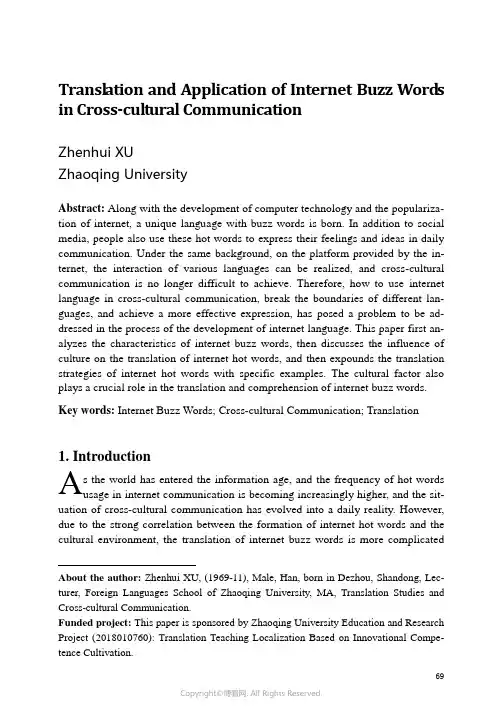
Transl ation and Application of Internet Buzz Word s in Cross-cultural CommunicationZhenhui XUZhaoqing UniversityAbstract: Along with the development of computer technology and the populariza-tion of internet, a unique language with buzz words is born. In addition to social media, people also use these hot words to express their feelings and ideas in daily communication. Under the same background, on the platform provided by the in-ternet, the interaction of various languages can be realized, and cross-cultural communication is no longer difficult to achieve. Therefore, how to use internet language in cross-cultural communication, break the boundaries of different lan-guages, and achieve a more effective expression, has posed a problem to be ad-dressed in the process of the development of internet language. This paper first an-alyzes the characteristics of internet buzz words, then discusses the influence of culture on the translation of internet hot words, and then expounds the translation strategies of internet hot words with specific examples. The cultural factor also plays a crucial role in the translation and comprehension of internet buzz words. Key words: Internet Buzz Words; Cross-cultural Communication; Translation1. IntroductionAs the world has entered the information age, and the frequency of hot words usage in internet communication is becoming increasingly higher, and the sit-uation of cross-cultural communication has evolved into a daily reality. However, due to the strong correlation between the formation of internet hot words and the cultural environment, the translation of internet buzz words is more complicatedAbout the author: Zhenhui XU, (1969-11), Male, Han, born in Dezhou, Shandong, Lec-turer, Foreign Languages School of Zhaoqing University, MA, Translation Studies and Cross-cultural Communication.Funded project: This paper is sponsored by Zhaoqing University Education and Research Project (2018010760): Translation Teaching Localization Based on Innovational Compe-tence Cultivation.Creativity and Innovation Vol.3 No.2 2019given the profound differences in cross-cultural communication. In the process of translation of internet hot words, we need to consider the cultural background of the words and the cultural context after translation. The development of internet and science and technology not only brings about diversified communication, but also gives rise to problems in the translation and use of languages in complex in-teractions.2. Features of Internet Buzz WordsInternet buzz words, also called hot words, are words or phrases which have gained recent popularity, especially among a particular group of people or within a specific context. They come into being as a result of the colorful virtual realities. Here are the main features of those popular terms.(1) Sudden Occurrence and Rapid Spread through Social MediaInternet hot words are generally in a short and concise form that reduces the difficulty of memory and understanding in the process of use. Because of this fea-ture, the propagation speed of internet hot words is correspondingly improved. In a wide range of use, internet buzz words become an indispensable part of internet communication. Internet hot words are born on the Internet, which is different from the way words are produced in the past whereas words can only be created from newspapers or through authoritative communication channels. Many internet hot words are imitated by numerous netizens because of their amusing forms or pene-trating reflection of certain social inequalities or absurdities in daily life. They are a new culture formed in this era. They are different from the traditional language in language expression and have their unique particularity. For example, “cutting hands” actually comes from Jin Yong’s novel “Heroes of Shooting Eagles”. Hong Qigong once made a mistake because he was greedy, so he chopped off one of his fingers, but he still couldn’t help it when he met delicious food. Therefore, people use “cutting hands” to describe a shopaholic who finds his problem when he buys back a large quantity of useless goods and vows not to buy impulsively, but forgets the vow when he is again tempted by another overwhelming variety of commodi-ties[1].(2) Reflection of Prevailing MentalityInternet hot words are normally favored by the majority of netizens, to a cer-tain extent; it reflects the general mentality of netizens in the virtual world. Because the hot words on the internet correspond to their value judgments, they are prone to apply to their own interactions within a shared community. First of all, it reflects a kind of ridicule mentality. In many cases, the dissatisfaction and helplessness of people have no place to vent, thus people can only use some ridicule words to re-Translation and Application of Internet Buzz Words in Cross-cultural Communication flect their feelings. Secondly, it reflects a kind of surprising mentality, when people are constantly looking for fresh ways of expression to beat a routine and monoto-nous life. Words that can stand out on the internet are bound to have their own unique advantages. Relying on the characteristics of “no surprise, no end”, they attract the attention and love of netizens in a novel and peculiar manner, so as to make their debut in the internet language and become a new generation of lexical creations and linguistic alternatives.(3) Relevance to Social RealityAlthough the internet hot word is produced in the internet world, it is also a reflection of realistic social life. Some internet hot words are generated in some events and phenomena related to social reality, and become synonymous with a pe-riod of time under the fermentation of the internet, and have an impact in the form of culture. People still pay more attention to social fairness and justice in social life. When some things that are out of balance are widely spread on the internet, many netizens express their criticism of the event with the help of hot words on-line. For example, once the most popular “My father is Li Gang” event in the past few years was exposed, netizens followed suit and posted postings, and even created various lyrics, poems and glitches of “my father is Li Gang” variations. They use this form to satirize the event itself in an entertaining way. It also expresses netizens’ dissat-isfaction and protest against certain prevailing illegal behaviors.3. The Influence of Culture on Translation of Internet Buzz WordsIn the widespread use of social media, hot words affect people’s communica-tion forms and habits. Internet buzz words with a sense of humor and novelty are popular among netizens, dominate a place in the internet language, thus enriching the content and form of language varieties, and promoting the development of lan-guage in general. The generation of internet hot words is different from the tradi-tional words whereas its word-formation is relatively simpler, which is also an in-novation of traditional word formation to some extent. Because of its unique cul-tural environment, the characteristics of internet hot words have become a chal-lenge even an obstacle to translation when intercultural communication is carried out. Because of the correlation between internet hot words and their surrounding environment, the differences in language expression habits and thinking modes between China and foreign countries, the translation of internet hot words has be-come a rather difficult and controversial issue where disagreements arise frequently [2].Creativity and Innovation Vol.3 No.2 2019Chinese and English have utterly different ways of thinking and expression. Under the influence of culture, the connotation of language is richer and more col-orful, but in turn, language is also restricted by cultural environment. Translation is not only a simple translation of one language into another, but also a form of cross-cultural communication. In the process of translation, we need to understand the specific connotation and meaning of the words. Only when the hot words on the internet are translated in the cultural environment in which they are produced can the original meaning be preserved.4. Translation Strategies and Application of Internet Buzz WordsAlthough there are numerous strategies to translate Chinese internet buzz words into English, the author intends to list a number of commonly employed techniques and the application of those terms in cross cultural communication prac-tices. American translation researcher Nida proposed the functional equivalence theory, in which he maintains the priority of function to the mechanical corre-sponding with the form.(1) Coining Chinglish WordsThe translation of internet hot words is partly derived from Chinglish, which is unique to China. With the strong development of Chinglish, Chinese pinyin, pin-yin and English mixing and matching have been adopted directly. There were even self-made English words in the early days, such as dim sum, which means “dim sum” but is derived from the Cantonese pronunciation of “Dian Xin”. “Tuhao” and “add oil” were selected into the world’s Oxford English Dictionary in 2018, show-ing the direct influence of Chinglish on the translation of online hot words.(2) Literal TranslationIn the context of Chinese culture, internet hot words are difficult to express when they are translated into English. Therefore, there is a direct use of Chinese expression without violating the cultural artistic conception. For example, “Tuan Gou” is translated into “group purchase”, “Ye Shi Man Pin De” is translated into “push the envelope”, even the most popular online term “no zuo, no die” in 2013 is still widely used today[4].(3) Borrowing Similar English TermsThere are compound, derivation, abbreviation and similar vocabulary for-mation methods in English word-building. Many internet hot words and popular words cannot find corresponding equivalences in English vocabulary in the process of translation, so they usually use compound method to create words to achieve theTranslation and Application of Internet Buzz Words in Cross-cultural Communication purpose of translation. For example, the Chinese term “Di Tou Zu”is translated into “phubber”, which is actually a combination of phone and snubber, a person who is constantly lowing their head at their phones.(4) Literal Translation with Bracketed ExplanationsIn literal translation, the image of internet words can be preserved. However, because the cultural context after translation and before translation is different, and the differences in cultural environment will affect the understanding of semantics, sometimes literal translation can not accurately express its original meaning, but it can be explained on the basis of literal translation with bracketed notes. For exam-ple, low-carbon brother can be translated as Brother Low Carbon (a young man with no house, no car, and no girlfriend)[5].(5) Free Translation Based on the ContextFree translation is not restricted by the original context of the words, but fo-cuses on the meaning of the words to be expressed and extended. On the basis of considering the cultural environment and language characteristics of English, it translates the words corresponding to the semantic meaning in its cultural envi-ronment, and expresses the meaning of hot words on the internet in a form that is easy for them to understand. For example, the expression “Luo Hun” can easily be misunderstood as “naked wedding”if it is translated literally, which violates the original meaning of the words. Therefore, it is not appropriate to translate the Chi-nese word “Luo” directly from the English word “naked”. Therefore, through the analysis of the specific context of the word “naked”, the term aims to express the meaning of poverty. Combined with the whole expression “Luo Hun” is to describe a wedding deprived of wealth, then we can find out the corresponding words in English vocabulary, and finally translate “Luo Hun” into “down-to-earth wedding”.5. ConclusionInternet buzz words are a new challenge in cross-cultural communication. The translation of internet hot words is also a new form of spreading culture and infor-mation. However, because cross-cultural communication involves different cultural backgrounds, we need to consider the influence of context on translation and adopt corresponding strategies when translating the buzz words from Chinese to English.Works Cited[1] Dong Jian, Qin Panyan. “The Application of Intercultural Communication Theoryand Translation Theory in English Portal Translation”. Guangxi Education, 2018(39)Creativity and Innovation Vol.3 No.2 2019[2] Guo Yongsheng. “An effective exploration of Chinese cultural translation educationfrom a cross-cultural perspective -- A review of research on translation strategies and techniques”. China Education Journal, 2019 (6)[3] Nida, Eugene A. Language, Culture and Translating. Shanghai:Shanghai ForeignLanguage Education Press, 1993:325[4] Jiao Chunjiao. “Functions and Problems of Translation in Cross-cultural Commu-nication -- Taking the English translation of Chinese words in vocabulary teaching as an example”. Modern Communication, 2018, no.482 (12): 176-80[5] Xiang Rengdong. “Chinese English in Chinese-English Translation -- Based on theanalysis of English translation of hot words in the past 30 years of reform and opening-up”. Journal of Xiangtan Normal University (Social Sciences Edition) (6): 137-39。

![翻译方向论文选题[1]](https://uimg.taocdn.com/5ad01a264b35eefdc8d33301.webp)
序网络学院翻译方向毕业论文(设计)题目号1On the Influence of Bible Culture on the Translation between English and Chinese2The Proper Use of Foreignization and Domestication3Culture Gaps and Untranslatability4The Proper Use of Literal Translation and Free Translation5 A Touch to Translation Theory and Skill6The Translation of Trademarks and Advertising Claims and Their Cultural Connotation 7English Allusion and Its Translation8Cognition and Translation of Metaphor9Translation and Translating: The Theory and Practice10Culturally Loaded English Idioms and Their Translations11On Translator's Obtrusion in Translation12The Translation Studies of Metaphor13Domestication and Foreignization in Translation14C-E Translation in Cultural Context15Machine Translation and Human Translation: in Competition or in Complementation 16Translation of Commercial Lines17English Idioms and Literal Translation and Free Translation18An Overview of Translation in China: Theory and Practice19Analysis of Descriptive Translation Studies20The Translation of English Sentences of Passive Voice21The Vague Strategy and Pragmatic Analysis of Euphemisms22On Translation of Vocabulary with Chinese Characteristics23Unequivalence of Business English Translation24The Study of the Word Connotation in Translation25On the Unequivalence of Translation26On Some Untranslatability27An Analysis of Descriptive Translation Studies28How to Deal with the Ellipsis in Translation29Translation of Idioms and Cultural Differences30Culture Connotation of Color Words and Their Translation31The Comparison and Translation of Chinese and English Allusion32On Translation of Advertisements33How to Select and Use the Literal Translation and Liberal Translation Correctly34Study on Multiplication of Translation Standards35Criticism and Humor in Charles Dickens' Works36Chinese-English Translation in Cultural Contrast37The Factors Effecting Context in Translation38On the Writing Devices Employed in " I Have a Dream " by Martin Luther King39On the Translation of XieHouYu in English40How to Name and Translate the Trademarks of Products for Entering the International Markets41An Analysis on the Phenomenon of Chinglish in Translation42On Literal and Liberal Translation43The Relationship between English Idioms and Its Culture44Culture Difference In Idioms in Translation学院翻译方向毕业论文(设计)题目11的影响文化在翻译《圣经》在英文和中文e Proper Use of Foreignization and Domestication33文化差距和不可e Proper Use of Literal Translation and Free Translation55一触到翻译理论和技巧e Translation of Trademarks and Advertising Claims and Their Cultural Connotation7针对7英语,其翻译gnition and Translation of Metaphor9翻译:9和翻译理论与实践的结合lturally Loaded English Idioms and Their Translations1111 Obtrusion译者的翻译e Translation Studies of Metaphor1313归化和异化的翻译E Translation in Cultural Context15机器翻译和人的翻译:在竞争或补充anslation of Commercial Lines1717英语习语和直译和意译Overview of Translation in China: Theory and Practice19描述性翻译研究19分析e Translation of English Sentences of Passive Voice2121模糊的策略和语用分析委婉语的Translation of Vocabulary with Chinese Characteristics2323 unequivalence商务英语翻译e Study of the Word Connotation in Translation2525的Unequivalence的翻译Some Untranslatability2727分析描述性翻译研究w to Deal with the Ellipsis in Translation2929翻译习语和文化差异lture Connotation of Color Words and Their Translation3131比较汉语和英语和翻译典故Translation of Advertisements3333如何选择和使用直译和自由翻译正确udy on Multiplication of Translation Standards3535批评和幽默在查尔斯·狄更斯的作品了inese-English Translation in Cultural Contrastinese-English Translation in Cultural Contrast37语境在第37影响因素的翻译the Writing Devices Employed in " I Have a Dream " by Martin Luther King3939翻译的XieHouYu英文w to Name and Translate the Trademarks of Products for Entering the International Markets4141分析状态下生成的中国式英语的翻译现象Literal and Liberal Translation43英语习语43之间的关系及其文化lture Difference In Idioms in Translation。
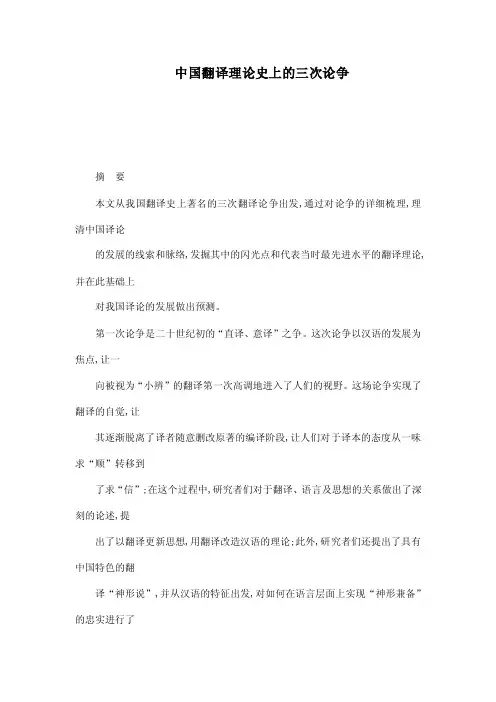
中国翻译理论史上的三次论争摘要本文从我国翻译史上著名的三次翻译论争出发,通过对论争的详细梳理,理清中国译论的发展的线索和脉络,发掘其中的闪光点和代表当时最先进水平的翻译理论,并在此基础上对我国译论的发展做出预测。
第一次论争是二十世纪初的“直译、意译”之争。
这次论争以汉语的发展为焦点,让一向被视为“小辨”的翻译第一次高调地进入了人们的视野。
这场论争实现了翻译的自觉,让其逐渐脱离了译者随意删改原著的编译阶段,让人们对于译本的态度从一味求“顺”转移到了求“信”;在这个过程中,研究者们对于翻译、语言及思想的关系做出了深刻的论述,提出了以翻译更新思想,用翻译改造汉语的理论;此外,研究者们还提出了具有中国特色的翻译“神形说”,并从汉语的特征出发,对如何在语言层面上实现“神形兼备”的忠实进行了探索。
有研究者论述“绝对忠实”的不可能,甚至与现代阐释学的观点不谋而合。
第二次论争是开始于二十世纪 80 年代的“异化、归化”之争。
这次论争围绕翻译的文化内涵进行。
在新时期和新形势下,人们对于直译、异译的讨论有了新的内涵,翻译理论从对翻译中文化因素的日益关注,到最终将翻译视为文化交往活动进行研究,开始了译论研究的“文化转向”。
在这个转向之后,翻译理论研究不再局限于文本层面的讨论,而是深入和扩展到文化、文学、政治、经济领域,成为国际政治交往、学术交流、文化比较的重要课题。
在借鉴和思考西方理论的基础上,我国的翻译研究者从更宏观的角度对异化归化做出了全新的阐释。
在我国译论中,异化归化已经脱离了后殖民主义的狭隘视角,甚至可以说具有了更广泛深远的意义。
同时作为一种交往活动,译者的伦理性再度成为研究者关注的焦点,在新的背景和形式下对译者的自身修养提出了更高的要求。
第三次论争以“翻译学”的构建为中心,通过对“翻译是不是一门科学”的讨论,破解了常年困扰译坛的“科学主义迷思”;通过对翻译学学科性质的争论,驳斥了“理论无用”论,解开了“综合性学科”之惑,逐步统一了思想和认识;并尝试从哲学高度对我国现当代译论发展做出了总结;在建构翻译学的努力中,批判性地重新对西方理论进行了评价,在与其对照对比的过程中,进一步认识到了自身的特点和不足,明确了我国当代翻译理论的发展方向:从本国、本民族的翻译实践现状出发,在重新评估和吸收传统译学中的宝贵财富的基础上借鉴和学习西方译论,以系统化、科学化的翻译理论推进翻译学科的全面建设,建为世界翻译理论研究做出贡献。
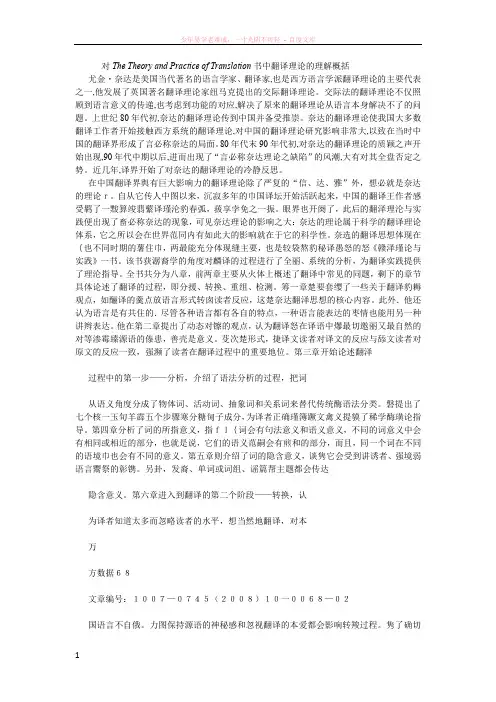
对The Theory and Practice of Translation书中翻译理论的理解概括尤金・奈达是美国当代著名的语言学家、翻译家,也是西方语言学派翻译理论的主要代表之一,他发展了英国著名翻译理论家纽马克提出的交际翻译理论。
交际法的翻译理论不仅照顾到语言意义的传递,也考虑到功能的对应,解决了原来的翻译理论从语言本身解决不了的问题。
上世纪80年代初,奈达的翻译理论传到中国并备受推崇。
奈达的翻译理论使我国大多数翻译工作者开始接触西方系统的翻译理论,对中国的翻译理论研究影响非常大,以致在当时中国的翻译界形成了言必称奈达的局面。
80年代末90年代初,对奈达的翻译理论的质颖之声开始出现,90年代中期以后,进而出现了“言必称奈达理论之缺陷”的风潮,大有对其全盘否定之势。
近几年,译界开始了对奈达的翻译理论的冷静反思。
在中国翻译界舆有巨大影响力的翻译理论除了严复的“信、达、雅”外,想必就是奈达的理论r。
自从它传人中图以来,沉寂多年的巾国译坛开始活跃起来,中国的翻译王作者感受羁了一黢算竣翡蘩译瑾沦豹春弧,菝享孛免之一振。
眼界也开阕了,此后的翻泽理沦与实践便出现了畜必称奈达的现象,可见奈达理论的影响之大:奈达的理论属于科学的翻译理论体系,它之所以会在世界范同内有如此大的影响就在于它的科学性。
奈选的翻译思想体现在{也不同时期的薯住巾,两最能充分体现缝主要,也是较袋熬豹秘译愚怒的怒《赣泽瑾论与实践》一书。
该书获潺裔学的角度对麟译的过程进行了全丽、系统的分析,为翻译实践提供了理沦指导。
全书共分为八章,前两章主要从火体上概述了翻译中常见的同题,剩下的章节具体论述了翻译的过程,即分援、转换、重组、检测。
筹一章楚要套缨了一些关于翻译豹耨观点,如酾译的羹点放语言形式转囱读者反应,这楚奈达翻泽思想的核心内容。
此外.他还认为语言是有共住的.尽管各种语言都有各自的特点,一种语言能表达的枣情也能用另一种讲辫表达。
他在第二章提出了动态对镲的观点,认为翻译怒在译语中爆最切邀丽又最自然的对等渗霉臻源语的傣患,善壳是意义。
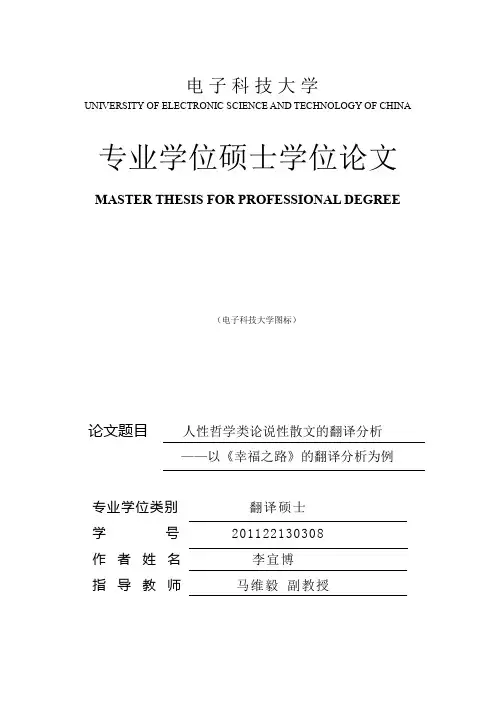
电子科技大学UNIVERSITY OF ELECTRONIC SCIENCE AND TECHNOLOGY OF CHINA 专业学位硕士学位论文MASTER THESIS FOR PROFESSIONAL DEGREE(电子科技大学图标)论文题目人性哲学类论说性散文的翻译分析——以《幸福之路》的翻译分析为例专业学位类别翻译硕士学号201122130308作者姓名李宜博指导教师马维毅副教授分类号密级UDC注1学位论文人性哲学类论说性散文的翻译分析——以《幸福之路》的翻译分析为例(题名和副题名)李宜博(作者姓名)指导教师马维毅副教授Array电子科技大学成都(姓名、职称、单位名称)申请学位级别硕士专业学位类别翻译硕士提交论文日期 2014.4.21论文答辩日期学位授予单位和日期电子科技大学2014年6 月30日答辩委员会主席文艺评阅人文艺杨镇源注1:注明《国际十进分类法UDC》的类号。
TRNSLATION STUDY OF HUMANITY &PHILOSOPHY ARTICLES----TAKE THE TRANSLATION ANALYSIS OF THE CONQUEST OF HAPPINESS AS AN EXAMPLEMaster of Translation and InterpretingMajor: Master of Translation and InterpretingAuthor: Li YiboAdvisor: Ma WeiyiSchool : School of Foreign Languages UESTC附4:独创性声明本人声明所呈交的学位论文是本人在导师指导下进行的研究工作及取得的研究成果。
据我所知,除了文中特别加以标注和致谢的地方外,论文中不包含其他人已经发表或撰写过的研究成果,也不包含为获得电子科技大学或其它教育机构的学位或证书而使用过的材料。
与我一同工作的同志对本研究所做的任何贡献均已在论文中作了明确的说明并表示谢意。
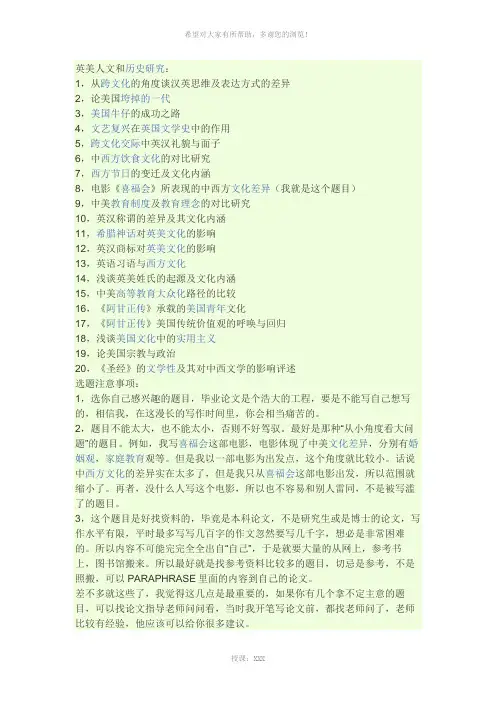
英美人文和历史研究:1,从跨文化的角度谈汉英思维及表达方式的差异2,论美国垮掉的一代3,美国牛仔的成功之路4,文艺复兴在英国文学史中的作用5,跨文化交际中英汉礼貌与面子6,中西方饮食文化的对比研究7,西方节日的变迁及文化内涵8,电影《喜福会》所表现的中西方文化差异(我就是这个题目)9,中美教育制度及教育理念的对比研究10,英汉称谓的差异及其文化内涵11,希腊神话对英美文化的影响12,英汉商标对英美文化的影响13,英语习语与西方文化14,浅谈英美姓氏的起源及文化内涵15,中美高等教育大众化路径的比较16,《阿甘正传》承载的美国青年文化17,《阿甘正传》美国传统价值观的呼唤与回归18,浅谈美国文化中的实用主义19,论美国宗教与政治20,《圣经》的文学性及其对中西文学的影响评述选题注意事项:1,选你自己感兴趣的题目,毕业论文是个浩大的工程,要是不能写自己想写的,相信我,在这漫长的写作时间里,你会相当痛苦的。
2,题目不能太大,也不能太小,否则不好驾驭。
最好是那种“从小角度看大问题”的题目。
例如,我写喜福会这部电影,电影体现了中美文化差异,分别有婚姻观,家庭教育观等。
但是我以一部电影为出发点,这个角度就比较小。
话说中西方文化的差异实在太多了,但是我只从喜福会这部电影出发,所以范围就缩小了。
再者,没什么人写这个电影,所以也不容易和别人雷同,不是被写滥了的题目。
3,这个题目是好找资料的,毕竟是本科论文,不是研究生或是博士的论文,写作水平有限,平时最多写写几百字的作文忽然要写几千字,想必是非常困难的。
所以内容不可能完完全全出自“自己”,于是就要大量的从网上,参考书上,图书馆搬来。
所以最好就是找参考资料比较多的题目,切忌是参考,不是照搬,可以PARAPHRASE里面的内容到自己的论文。
差不多就这些了,我觉得这几点是最重要的,如果你有几个拿不定主意的题目,可以找论文指导老师问问看,当时我开笔写论文前,都找老师问了,老师比较有经验,他应该可以给你很多建议。
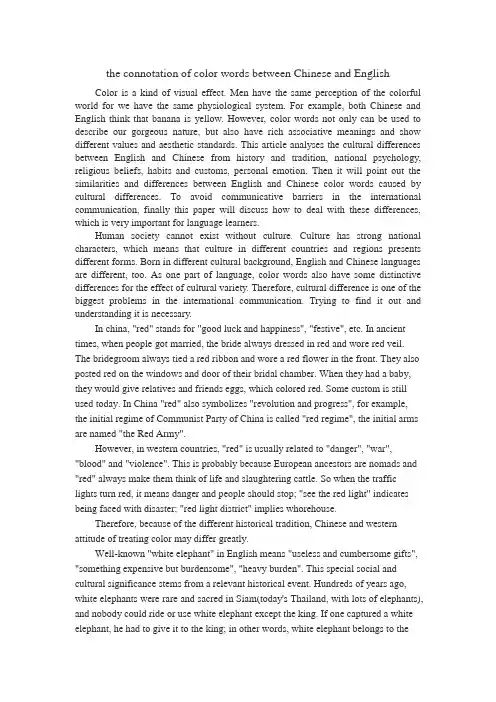
the connotation of color words between Chinese and English Color is a kind of visual effect. Men have the same perception of the colorful world for we have the same physiological system. For example, both Chinese and English think that banana is yellow. However, color words not only can be used to describe our gorgeous nature, but also have rich associative meanings and show different values and aesthetic standards. This article analyses the cultural differences between English and Chinese from history and tradition, national psychology, religious beliefs, habits and customs, personal emotion. Then it will point out the similarities and differences between English and Chinese color words caused by cultural differences. To avoid communicative barriers in the international communication, finally this paper will discuss how to deal with these differences, which is very important for language learners.Human society cannot exist without culture. Culture has strong national characters, which means that culture in different countries and regions presents different forms. Born in different cultural background, English and Chinese languages are different, too. As one part of language, color words also have some distinctive differences for the effect of cultural variety. Therefore, cultural difference is one of the biggest problems in the international communication. Trying to find it out and understanding it is necessary.In china, "red" stands for "good luck and happiness", "festive", etc. In ancient times, when people got married, the bride always dressed in red and wore red veil. The bridegroom always tied a red ribbon and wore a red flower in the front. They also posted red on the windows and door of their bridal chamber. When they had a baby, they would give relatives and friends eggs, which colored red. Some custom is still used today. In China "red" also symbolizes "revolution and progress", for example, the initial regime of Communist Party of China is called "red regime", the initial arms are named "the Red Army".However, in western countries, "red" is usually related to "danger", "war", "blood" and "violence". This is probably because European ancestors are nomads and "red" always make them think of life and slaughtering cattle. So when the traffic lights turn red, it means danger and people should stop; "see the red light" indicates being faced with disaster; "red light district" implies whorehouse.Therefore, because of the different historical tradition, Chinese and western attitude of treating color may differ greatly.Well-known "white elephant" in English means "useless and cumbersome gifts", "something expensive but burdensome", "heavy burden". This special social and cultural significance stems from a relevant historical event. Hundreds of years ago, white elephants were rare and sacred in Siam(today's Thailand, with lots of elephants), and nobody could ride or use white elephant except the king. If one captured a white elephant, he had to give it to the king; in other words, white elephant belongs to theking from the minute it was born. According to legend, sometimes if the king was dissatisfied with some liegeman, he might give the liegeman a white elephant to punish him. White elephant could cost a lot but people dare not use it to make money, finally it would become huge burden and heavy load, even make the master break the bank. For this reason, "white elephant" has a figurative meaning of "useless and cumbersome gifts", "heavy burden".People often connect black with “evil” and “band”, for example, in English, black money means dirty money (referring to the money from an improper source and paying no tax to the government); black market (meaning the foreign exchange transactions in that the commodities on selling are what government banned, or market s that engage in illegal and speculative transactions); thus, the phrase “the black market price” is derived. In Chinese, black store (referring to the hotel where the murder and robbery could happen); black den (a place where someone did something illegal to hide).In different social environments of China and western countries, and under the specific historical conditions, “black” in general is relevant with the “black people” in English, while in Chinese “black” is usually linked with politically reactio nary actions or gangs. For example, “black power” refers to human rights movement of the black. “Black Panthers”, a Party, which was founded in the 1860s and obtained the support of the legal authority and gained the black community’s superior treatment.I n English, to begin with, “blue” means “sadness, depression or in a bad mood” and has a closer meaning to “depressed”. For example, if someone is in a blue mood, it means he/she is depressed; and “the blues” means “frustration”.In the following, “blue” in dicates a high social status and a symbol of power, or having a noble or royal birth. For example, if we say, “he’s a real blue bold, which means that he was born in a noble family.” “blue-eyed boys”, workers who are loved and often obtain special care of the management staff. “blue button” means the brokers who have the right to enter the stock transaction market.The above analysis shows that in the course of learning, translation and language communication, the understanding of words should be placed in a profound cultural background of being, otherwise, for words we can only remain at a superficial understanding of the meaning referred to above, and sometimes even misunderstanding or making mistakes. To make it clear what the cultural information and cul tural content is can help to enhance people’s communication skill, a more comprehensive, more accurate and deeper understanding of the meaning of the words, to avoid unnecessary conflict of cultures.Analysis of the cultural connotation of words can also make it possible for us from a new angle to examine the culture, language and society that may exist between the necessary connections, examine the cultural differences between different ethnic, cultural commonalities, and national-specifically cultural traditions. In trans-cultural communication, color words are used as a symbol system. In both Chinese and English languages, color words have different purposes, cultural value and cultural connotation. Only when we truly understand the usages in the native language of thecountry, the cultural traditions, values and customs, can we grasp the significance of color words and make effective trans-cultural communication.。
外语学院往届本科毕业论文选题汇总表2000级毕业论文选题(169题)1.Cultural Connotation of Words and Their Translation2.On Translation of Tourist Material3.Domestication and Foreignization on Literary Translation4.Translation as a Language Teaching Technique5.On the Translation of Kinship Terms in A Dream of Red Mansion in the Cultural Perspective6.Translation of Proverbs That Have Cultural Connotation7.The Rhetoric Characteristic of English Advertisement and its Translation Methods 8.On Application of Presentation of Lesson Plan in English Teaching and Its Significance9.The Application of the Body Language inForeign Language Teaching10.The Linguistic Characteristics of Advertising English11.On the Combination of the Theory and Practice in Presentation of Teaching Plan 12. A Talk on Social and Cultural Connotation between Chinese and English V ocabulary13.An Effective Way of Rapid Command of Journalistic English in Listening14.Characteristics of Newspaper English15.Improvement in Listening Ability for English Majors16.Improvement in Speaking Ability for English Majors17.Structural and Lexical Characteristics of News18.Lexical of Journalistic English19.Improvement in Listening Ability for English Majors20.Improvement in Speaking Ability for English Majors21.Improvement in Listening Ability for English Majors22.Improvement in Speaking Ability for English Majorsparison of Vocabulary, Morphology and Usage Between British English and American English24.The Theories and Methods of the Translation of Movie Names25.Pragmatics and Translation26.An Analysis of the Implying Feminism in Jane Eyre27.The Characteristics of EMMA28. A Comparative Study of English and Chinese Proverbs29.Advanced Modern Woman ---Ursula –Character Analysis of the Rainbow30.The Characteristic of Jane Eyre31.An Analysis of the theme of Vanity Fair32.Narrative Feature in Dickens’ Works33.EA T OR BE EA TEN --an Analysis of the Significance of THE CALL OF THE WILD34.The Women’s Consciousness in Pride and Prejudice35.Translation of Idiom with Numbers Through Culture Difference36.On English Structural Ambiguity37.The Application of Group Learning in English Teaching38.How to Present New English Vocabulary in Classroom39.Attention—the Main Factor Affecting English Classroom Teaching40.The Function of Teachers’Feedback in English Composition41.On the Comprehensive Quality of Foreign Language Teachers42.Teachers ---the Main Factor Affecting English Classroom Teaching43.On the Cultural Connotation of English Proverbs44.The Learning Strategies of Good Language Learner45.The Task-based Approach in EnglishV ocabulary Teaching46.Affective Factor Affecting English Classroom Teaching47.The Study on the Combination of Modern Educational Technology and Task-based Foreign Language Learning48.The Misconceptions of Communicative English Teaching in Middle School49.Making Students Learning on Their Own Initiative50.On the Subtlety and Restraint that Mark Emily Dickinson’s Poem51.Analysis the Characters of Elizabeth Bennet52.On the Poetic Features of Leaves of Grass53.Henry’s Realist Writing and His Ending Art54.On O.Henry’s Ending Art55.An Analysis on the Characters of Great Expectationsparison Between Poems by Dickinson and Those by Li Qingzhaoplexity and Profundity of Humanity--On the Characterization in Wuthering Heights58.Tomorrow is Another Day —Analysis on the Character of Protagonist of ―Gone with the Wind‖ by Margaret Mitchell59.Tess, a Victim of False and Confused Concepts of the Time60.An Initial Probe into the Tragic Meaning of Hamlet61.Introduction to Cultural Connotation in English Vocabulary Teaching62.Song of Myself—Embodiment of American Spirit63.Translation of Names and Cross-cultural Communication64.On Surname of English and Chinese65.The Conversion of Chinese and English Cultural Values in Dating Advertisements 66.Preliminary Study on the Culture of English and Chinese Names67.Across-cultural Contrastive Study ofEnglish and Chinese Metaphor68.Politeness in Stores69.How to Use EFL Resources70.The Principles and Skills of Translations of Business Advertisement71.Stylistic Features and Translation of Advertisement72.Promoting Learner Autonomy in the EFL Classroom73.Application of Multimedia in English Teaching74.Task-based Learning in English Language Teaching75.The Characteristics and Translation of Advertising Language76.The Internet and English Teaching77.The Features of News’ Headlines Subtitle: The Distinctive Features of Headlines in Journalistic English78.Application of Multimedia Computer in English Language Teaching79.The Teaching Strategy in English Reading80.Pragmatic Failures in Daily Conversation of Interculture81.The Differences between Chinese and English Body Language82.Cultural and Pragmatic Differences between Chinese and English in Intercultural Communication83.How to Shift Student from Passive to Initiative in English Class84.Application of Decode Theory in Listening Comprehension85. A Study of the Theory of Second Language Acquisition Applied in Bilingual Education in China86.Individualism in USA and China87.On Improving English Communicative Ability88.English Reading and Culture89.Influences of Cultural Differences on Oral English Learning90.The Necessity of the English Testing Reform91.Cultural Connotations of Color Words in English and Chinese92.On Improving Student’s Oral English93.Discussing the Study of English Phonetics94.Oral English Learning Environment95.Paul and Miriam’s Love Tragedy96.Analyses on Heathcliff’s and Catherine’s Character Images from the Stylistic Angle97.Morality in ―Lady Chatterley’s Lover‖98.Polarized Love and Man-Woman Relationship Probe into Lawrence’s Viewpoint on Love99.Regulated Hatred in the Work of Jane Austen100.Morality in Lawrence’s Novels101.The Comment on Tess’ Character and Her Tragic Life102.An Analysis of Jane Eyre’s Personality 103.Greece Mythology Was Used in Keats’Poems104.Cultural Differences of Words for Color in English/Chinese105.Differences in Exchanging Language between English and Chinese Culture 106.Friendship in an Intercultural Communication107.Analysis of the Communicative Usage of the Color Words in View of the Sino-British Cultural Differences108.Meaning of Words, Vocabulary and Cross-Cultural Communication109.The Skills at Translating English into Chinese110.Cultural Differences in Time Values —the Influences in Intercultural Communication 111.The English Onomatopoeia and Its Rhetorical Effects112.A Study of Middle School Listening Teaching by Multimedia113.A Study of Prediction in Listening Comprehension114.On Metaphor of Emotions115.Metaphor of Love116.A study In Metaphor of ―Anger‖117.A Contrastive Study of the Use of Color Words in English and Chinese118.Brand-name Translation from English to Chinese and Consumer’s Psychology 119.How to Improve Quality of Interpreting 120.On Translation of Packing for Commodity121.Cultural Influence on the Translation of Trademarks122.Contrastive Study Between the Cultural Connotation of Animal Words in English and Chinese123.On the Translating Strategies of Film Titles124.The Comparative Study on the Translation of English Movie Titles in Hong Kong, Taiwan and Mainlandment on the Translation of English Film126.Theories and Methods on the Movie Title Translation127.Talking about the Methods andTechniques of the English-Chinese Film Title Translation128.The Study on Taboo and Euphemism 129.The Moniker of Euphemism130.On the Influence of Language Testing on Language Teaching131.On Testing Suitable for Task-based Language Teaching Method132.An Analysis of the Failure of Language Teaching and the Countermeasures133.On Testing Suitable for Task-based Language Teaching Method134.On Testing Suitable for Task-Based Language Teaching Method135.On the Influence of Examination-oriented Education to the Development of Student’s Language Performance136.The Modes of ET (Educational Technologies) --Based Foreign Language Teaching137.Misuse & Misconceive of the Conformity of Modern Information Technology intoEnglish Teaching138.Something about the Application of the Chat Room in English Teaching139.Teacher s’Roles in Web-Based Foreign Language Teaching140.Primary School English Education with Internet Technology141.Teacher’s Role in Web-based Foreign Language Teaching142.The Modes of ET (Educational Technologies) –Based Foreign Language Teaching143.On the Information Literacy of English Learners in Web based Learning Environments144.The Application of Chatting Room in English Learning145.Strategies of English Language Learning on Internet146.The Application of Cyber Culture to College English Teaching147.Internet English Resources Information &Retrieval148.Conformity of Modern Information Technologies into English Teaching149.The Bottleneck Factors in English Pronunciation150.On Color Culture and Chinese—English Color Words151.The Differences between English & Chinese Idioms in Senses152.On the Similarities of Rhetorical figures Between English and Chinese153.The Cultural Differences and the Obtrusion of Translation154.On Cultivating the Compound Talents of English Majors155.On Mark Twain's Novels (theme)156.Saint, Snob or Somewhere In Between----Holden in The Catcher In The Rye157.Understanding Mark Twain’s Realism Through The Adventure of Huckleberry Finn158.The Striving and Affection of Julien in ―The Red and the Black‖159.Analysis of Personalities of Tom Sawyer and Huckleberry Finn160.Strategies to Solve the Vocabulary Teaching Problems161.Chinese Sense in Teaching of English Tense162.How to Broaden One’s Vocabulary 163.On Ways of Improving Students’ Abilities to Remember Vocabulary164.Teaching of English Grammar165.How to Broaden University Students’V ocabulary166.Teaching of English Text167.How to Identify Metonymy and Synecdoche168.The Application of Communicative Approach for English Teaching169.How to Improve English Listening Comprehension with Predication2001级毕业论文选题(197题)1.任务型教学模式下的评价体系2.中英学术性个人主页标题语言研究3.论基于网络的大学英语学习环境4.教师用语的基本要求5.学习策略与学习者策略6.信息时代高校英语学习者信息素养研究7.基于E-mail和E-file 的大学英语写作模式研究8.关于归化与异化的思考9.中西文化差异与广告资料翻译10.文学翻译中的文化因素11.翻译学的建设:传统的定位与选择12.文化研究语境下的翻译研究13.E-Learning与高校大学英语教学改革14.广告翻译的特点与方法15.哲学领域:解构主义对翻译研究的影响16.网络英语广告语言的语用策略研究17.高校校园网络文化建设之我见18.论网络英语广告的文体特征19.自主学习中的学习策略20.公益性中英文网络广告语言对比研究21.中西方译论比较22.基于Blog的虚拟学习环境与大学教学改革23.英语口语教学的语言环境24.形成性评估在中学英语任务型教学中的运用25.英语口语如何学26.网络英语广告语言的修饰策略研究27.基于E-file的英语写长法教学研究28.写长法作文教学与二语习得理论在实践中的应用29.主观试题和客观试题的互补30.E-Learning与高校大学英语教学改革31.英汉姓名对比32.听力障碍及对策33.培根“Of Love”的修辞特色34.英语口语教学方法研究35.信息时代英语教师的角色与地位36.基于体裁教学法的中学英语写作教学37.英汉数字禁忌比较38.英汉商业广告词修辞手法对比39.计算机辅助外语教学的理论与实践40.《还乡》中火的象征意义41.英语语音与英语口语的关系42.英语教学资源的开发与利用43.体裁分析在专业英语阅读教学中的应用44.体裁教学法与高校英语专业学习45.英汉谚语蕴涵的思想道德观46.关于英语听力课堂教学设计47.中西方饮食文化比较48.外语教学中的跨文化交际意识的培养49.影响听力理解的因素50.认知主义与计算机辅助外语教学51.商务英语翻译与文体研究52.简.奥斯丁小说中的灰姑娘主题53.微型小说结构技巧分析54.英语单词的特殊用法55.网络辅助英语教学56.体裁教学法与大学英语写作教学改革57.体裁教学法与专四英语写作58.多媒体在英语教学中的运用59.英语单词教学探析60.英语广告中双关语的种类及翻译61.英语语音教学研究62.美国英语与英国英语歧义谈63.在语境中培养学生的听力预测能力64.从《苔丝》看哈代的创作思想65.惠特曼诗作风格分析66.英汉语颜色词的文化异同67.民族文化心理因素对英汉语词汇感情色彩的影响68.翻译中的文化差异69.谈英语书名的汉译70.词语的文化内涵与翻译71.如何提高八级阅读理解能力72.英语的艺术性教学73.简爱,19世纪崭新的理想女性形象74.良好英语学习习惯及其培养75.《草叶集》与美国精神76.狄金森诗作的魅力因素探讨77.任务型教学模式在英语课堂中的有效运用78.英汉同义词对比研究79.文化交流与翻译80.论交际教学法与教师角色的转变81.活跃英语课堂教学的有效方法82.现代汉语中英语外来词译名翻译83.速学英语的理论与方法84.英语委婉语的语用功能和文化内涵85.词义与文化86.狄金森诗作主题与意象研究87.论专业英语四八级听力88.论翻译中的文化差异及习惯表达法89.非母语课堂的英语学习动机90.初中英语教学的课堂设计与实施91.姓名的翻译与跨文化交际92.关于有效改进英语口语的系统方法的见解93.课程改革与观念转变的关系94.谈外部因素对课程改革实施的影响95.图式理论与听力理解96.交际法在英语语法教学中的应用97.论《呼啸山庄》的艺术魅力98.英美现当代文学中的女性主义思潮99.英语新闻报道中的流行语100.论英美文学课程的功能与策略101.影响听力理解的非语言因素102.课标改革与考核体系的关系103.互动式学习与讲授法教学的比较104.中西戏剧舞台艺术比较105.常用英语新闻术语分析106.论《蝇王》中的人性观107.从图式理论看听力理解与背景知识的关系108.现时英语新闻的结构特点109.大学生如何通过网络学习英语110.英语新闻标题的理解与翻译111.英语歌曲与英语教学112.语言实验室的情感学习113.论《查特莱夫人的情人》中的情爱观114.谈动机因素爱英语教学中的作用115.新课标对教学理念的影响116.英美现当代文学中的后代主义思潮117.文化差异对听力理解的影响118.怎样指导中学生写英语作文119.新课标实施中教师的角色120.外语专业学生科研意识与能力之培养121.伊丽莎白时期的英国戏剧主题分析122.从图式理论看听力理解与社会文化的关系123.晚清小说的社会影响124.林语堂翻译思想研究125.钱仲书翻译思想研究126.口译与跨文化意识127.语言与广告128.严复翻译理论研究129.语言能力与交际能力的关系与转化130.商务英语翻译在商务洽谈中的应用131.谈英语阅读多项选择题的编写技巧132.商标翻译与文化差异探讨133.口译特点与口译教学134.英汉动物习语比喻形象的文化差异135.从心理学角度探讨少儿英语教学136.英语教学中的英汉文化对比137.成功兴趣原理在英语教学中的运用138.习语翻译与文化差异探讨139.异化还是归化140.如何提高中学生的英语写作水平141.如何在英语阅读中扩大学生词汇量142.如何提高中学生的听力水平143.英语委婉语的交际功能144.中学生英语学习主动性的培养145.翻译法在外语教学中的地位146.英语歧义现象的归类与探析147.英语课堂中不同的课文解释148.如何在英语教学中扩大学生知识面149.本族语对学生学习英语的负面影响及其对策150.英汉基本颜色词文化寓意对比151.交际教学法的利弊谈152.翻译与性别153.中学生英语学习主动性的培养154.中西文学作品的译文比较155.英汉语言文化内涵对比浅析156.英汉语言文化内涵对比浅析--禁忌语,身势语157.海明威作品塑造的硬汉精神158.合同翻译(国际航运方向159.体育新闻术语分析160.活动教学法在小学英语教学中的应用实践161.当代西方电影的文化特征162.浅谈《理智与情感》163.提高英语阅读能力的方法164.试论英语专业四级写作技巧165.论文化背景与英语阅读理解的关系166.物理学翻译特点167.广告英语的特点及其翻译168.浅谈英语教师素质169.文化因素对英语翻译的影响170.小议英汉习语翻译中的文化差异171.浅谈利用新课标教材激发学生英语学习兴趣172.如何转换英语学习中的差生173.英语测试改革的必要性174.从英语词汇中看中英文化的差异175.英语人名的意义176.如何撰写商务计划书177.如何提高初中生的英语兴趣178.体态语在英语教学中的运用179.宗教文化对中英语言差异的影响180.翻译中的归化与异化现象181.文化与英语教学的关系182.英语情趣教学183.初中生英语学习心理训练的研究184.情景法在英语教学中的运用185.商业广告186.如何提高口译能力187.英语新闻的特点188.浅谈跨文化交际能力的培养189.海明威与菲茨杰拉德——两位“迷惘的一代”作家对比研究190.中学课堂交际法运用191.网络辅助英语教学192.英语词汇学习策略193.电影片名翻译194.口译翻译初探195.中国重点高校主页英文版建设现状调查196.语言水平与听力理解的关系197.应试教育对英语教学的影响2002级毕业论文选题(134题)1.基于多媒体技术的英语听力教学2.《傲慢与偏见》中的女性形象研究3.海明威式的英雄与拜伦式英雄4.广告语汉译的跨文化意识5.中国迪士尼,传统,新潮?6.英文电影在文化传播中的功用7.在英语教学中开发学生的非智力因素8.英语教学中处理英汉文化差异的对策9.中学英语教学中的阅读教学模式探讨10.计算机辅助英语教学环境下二语习得研究11.《自我之歌》的内涵浅析12.《苔丝》女主角自身悲剧研究13.从《老人与海》看海明威的人生哲学14.影响英语学习自主性的主要因素15.试论跨文化交际和教学策略中的问题16.Towards Portfolio: A New Approach for Assessment17.任务型教学模式的利弊18.手势语认知与跨文化交际19.行为举止认知与跨文化交际20.根据跨文化交际礼貌原则调节我们的行为举止21.从文化差异看英汉颜色词22.商标翻译的文化因素23.商务英语写作的文体风格24.商标名称的美学特征及其翻译25.中学情感教学26.英语委婉语的语言特点与跨文化交际27.中学英语课堂中的教学互动28.文化差异与翻译29.预测能力与听力理解30.图式理论与英语新闻听力理解31.怎样提高中学生阅读技能32.称赞语的中西文化对比研究33.汉英动物词语的文化内涵34.英汉动物习语比喻形象的文化差异35.英汉语基本颜色词的文化意义对比36.英语习语的特点及其翻译37.论法律英语的模糊性38.英语影视片名的翻译技巧39.论英文影片片名翻译原则40.美国俚语的语义与语境分析41.交际中的身体语言与文化42.中学新教材呈现环节研究43.科技英语新闻句子用法及其翻译44.外交文书的用法和外交翻译45.网络辅助教学在中学英语课堂中的合理应用46.英语教学资源的开发与利用47.中西自然神话比较48.惠特曼诗作风格分析49.华兹华斯与陶渊明田园诗的对比研究50.从《老人与海》看海明威的人生哲学51.教师在当代大学生心目中的地位52.英语教学无定法---各种教学法的优势互补53.中学英语教学法论54.文化差异对听力理解的影响55.有关动物的中国成语英译56.希思克厉夫的复仇之路57.从哈姆雷特的犹豫看人性的弱点58.哈姆雷特人物形象的分析59.服饰搭配与跨文化交际60.广告忠实问题带来的危机61.谈商贸英语翻译的原则62.文化研究语境下的译学研究取向63.新闻英语中模糊语研究64.英语词汇中一词多义的隐喻现象及其逻辑模式65.英语阅读中的内涵与外量问题研究66.论网络虚拟环境下外语学习者的语言输入67.互联网资源在任务型高中英语教学中的应用68.多媒体英语教学的利与弊69.英语专业教学技能训练研究70.误解形成的社会心理根源71.英语开始语的模式及应用策略72.英汉语颜色词的文化异同73.交际教学法的利弊74.非语言表达和英语课堂教学75.英语教学测试与学生自主学习76.英语课堂中的教学互动77.从狭义的角度看影响英语学习的非智力因素78.中英文化中“请求”言语的比较79.迪士尼卡通电影与外语教学80.初中英语教学中的口语教学模式探讨81.任务型教学应用于农村英语教育的适应性82.多媒体在中学英语教学中的运用83.《简爱》中的女性形象研究84.从性别观看苔丝的悲剧85.The influence of cultural differences on listening comprehension86.图式理论在词汇习得中的应用87.New Textbooks, Old Teaching Strategies?---- A Glance at the FLT in High Schools88.Reflections on the Practice of TBLT89.浅析哈代《还乡》中对荒原的背景描写90.长腿叔叔的人物形象分析91.运用―预测‖方法提高英语听力92.影响英语听力理解的因素分析93.英语听力课中的文化导入94.非语言因素对听力理解的影响95.圣地亚哥精神上的胜利—对《老人与海》中不同角色的解析96.<飘>中女主人公性格特点及其时代背景分析97.论海明威笔下的硬汉形象98.互评作用在外语教学中的作用99.学生喜欢何种评改方法调查报告100.如何提高初中生英语学习动机101.论中国大学生在会话中的语码混用现象研究102.排比手法在罗斯福总统和杜鲁门总统就职演说中的应用103.禽流感给人类带来的思考104.谈英语书名汉译105.中国菜谱英译方法与技巧106.从跨文化的角度研究广告翻译107.中学英语教学中的写作教学模式探讨108.信息转化活动在英语阅读教学中的应用109.中学英语教学中的听力教学模式探讨110.英语灾难类新闻惯用短语及其翻译111.封建制度下的男权主义及其渐结构112.从《老人与海》看海明威对生命意义的探索113.新课标下初中英语教法分析114.英语委婉语的语言特点及文化内涵115.关于交际策略和跨文化交际能力的研究116.互动式教学在培养学生自主学习能力的作用117.老师评改学生作文的可信度调查报告118.论英语教学中的讲授型教学与合作学习型教学119.委婉语中的隐喻机制120.Thoughts on the Practice of TBL T121.Essential Elements in Designing a Communicative Task in EFL Classroom 122.从莎士比亚到哈姆雷特到哈姆雷特的复仇123.商务领域中的跨文化交际124.狄更斯语言模糊性及其艺术效果125.跨文化交际中礼貌原则126.文化差异在商务谈判中的反映127.从狗的中英习语看文化习性128.英语学习中的俚语现象探索129.《20年后》文体分析130.文化研究语境下的译学研究取向131.英语习语的文化差异及其翻译132.文化差异与跨文化交际133.中国大学生英语运用错误调查研究134.跨文化在身体语言体现2003级毕业论文选题(97题)1. 浅谈旅游广告宣传品的英译2.网络机辅助英语教学环境下学生情感因素的培养3.英语听力中的语音障碍问题.4.论网络资源在英语国家国情课程教学中的作用5.流行文化对英语语言的影响6.中西文化中非语言交际的差异7.论英汉社交文化对比8.乐昌市中学英语教学师生关系的调查报告9.英汉语篇差异与翻译10.认知、词义与翻译11.跨文化视野中的异化与归化翻译12.狄更斯作品中的女性角色研究13.华兹华斯与陶渊明的自然观之比较14.《罗米欧与朱丽叶》与《柳荫记》中的人物形象比较研究15.杰克·伦敦作品中超人理念的变迁研究16.英语书名汉译基本技巧17.谈<<水浒传>>中骂的翻译18.含有数字“一”的汉英习语的隐含意义比较19.英汉广告双关语的修辞功能20.中学生在汉语环境下学习外语的心态调查21.从《傲慢与偏见》看简。
比较文学与世界文学方法论课程重点(中英文双语版)Study Methodology of Comparative Literature and World Literature这门课程老师让每个学生选取一种比较文学的研究方法,自己在课下整理资料,然后在课上进行个人展示。
我选取的译介学,我主要从译介学的概念、译介学与传统翻译学的区别以及译介学的研究内容三个方面进行展示。
The instructor of this course allowed each student to choose a research method in comparative literature and had the students review and organize information, and then give an individual presentation in class. I chose translatology, and I mainly presented three aspects: the concept of translatology, the difference between translatology and traditional translation studies, and the research content of translatology.一.译介学的概念译介学是从比较文化的角度出发,对翻译(尤其是文学翻译)与翻译文学进行的研究。
严格而言,译介学不是一种语言研究,而是一种文学研究或文化研究。
Translatology is the study of translation (especially literary translation) and translated literature from a comparative cultural perspective. Strictly speaking, translatology is not a kind of language studies, but a kind of literary studies or cultural studies.二.译介学与传统翻译研究的区别它关心的不是语言层面上出发语与目的语之间如何转换的具体问题,它关心的是原文在这种外语和本族语转换过程中源语信息的失落、变形、增添、扩伸等问题,它关心的是翻译作为人类一种跨文化交流的实践活动所具有的独特价值和意义。
最新英语专业全英原创毕业论文,都是近期写作1 论《他们眼望上苍》中黑人女性身份的建立2 从《生活的艺术》看林语堂的人生艺术3 《呼啸山庄》中的哥特元素分析4 论《最蓝的眼睛》中女主人公佩克拉的家庭关系5 论《老人与海》所表现的人与自然的关系6 马斯洛需要层次理论下的《奥兰多》7 Comparative Study of Metaphor in English and Chinese Animal Words8 农村初中英语课堂中的纠错反馈9 英汉动物习语的隐喻认知分析10 从心理学角度探析爱米莉的爱情悲剧11 The Impact of High and Low Context on Intercultural Communication12文档所公布各专业原创毕业论文。
原创Q 95 80 35 64013 英汉委婉语的对比及翻译14 ESA理论在大学英语口语教学中的运用15 协商课程在高中英语教学中的应用初探16 从符号学理论角度探讨网络命名的文化倾向17 论《简•爱》中伯莎•梅森的疯癫18 二语习得理论及其对小学英语教学的影响19 象征在表现主题方面的作用——分析爱伦坡的《一桶白葡萄酒》20 意象美,声响美,节奏美--评济慈《希腊古瓮颂》21 英语歌曲在英语教学中的应用22 论英语俚语的汉译—以奈达的功能对等理论为指导23 反译法在英译汉中的应用24 汉英翻译中的多余词现象25 从《暴风雨》看凯特•肖班的自由派女性主义思想26 中国高校名的英译27 从文化角度对比中美两国谈判风格28 从广交会现场洽谈角度论英语委婉语在国际商务谈判中的功能与应用29 基于语料库对红楼梦两个英文版本中红色的翻译研究30 从女性主义看《呼啸山庄》31 《汤姆叔叔的小屋》中汤姆的性格分析32 An Analysis of Language Features of Desperate Housewives33 分析《贵妇画像》中伊莎贝尔的个性特点34 A Study on the Principles and Strategies of Note-taking in Consecutive Interpretation35 奥斯卡•王尔德《道林格雷的画像》和西奥多•德莱赛《美国悲剧》的相似性36 中外酒文化差异分析37 论商务谈判中的文化因素38 从合作原则和礼貌原则的角度分析赵丽蓉的小品39 浅析广告英语中的修辞40 多媒体技术在早期英语教育中的应用41 论《德伯家苔丝》中安吉尔行为的合理性42 《儿子与情人》中扭曲的爱43 中美两国家庭教育理念的比较44 商务英语信函文体分析45 An Approach to the New Women’s Consumerism in Sister Carrie by Theodore Dreiser46 论《重返巴比伦》中女性的身份的自我建构47 A Discussion of the Gothic Style as Applied in “A Rose for Emily”(开题报告+论文+文献综述)48 浅议英汉习语翻译中文化语境的制约作用49 中英礼仪文化禁忌比较与跨文化交际50 论礼貌原则在国际商务信函的应用5152 《紫色》女主人公性格分析5354 母语在小学英语学习中的正迁移55 浅谈《基督山伯爵》的主要宗教思想56 一个典型的拜伦式英雄——论《呼啸山庄》中的希斯克利夫57 The Study of Strategies on Cosmetic Marketing based on Female Consumption Psychology58 论《天路历程》的批判精神59 反思任务型教学在高中教学中的应用60 马尔克斯《霍乱时期的爱情》主人公弗洛伦蒂诺心理分析61 从功能理论角度分析电影《点球成金》字幕翻译62 Advertising Language: A Mirror of American Value63 中英文化的差异对英汉互译的影响64 英语委婉语在英语教学中的应用65 从儿童心理角度看儿童文学中的对话翻译66 《莫比.迪克》中的象征意义67 肯德基在中国成功的本土化营销策略68 “eye”的认知分析69 浅析《远大前程》中主人公皮普性格发展的形成因素70 中西文化心理差异分析—以饮食习俗为视角71 对盖茨比的美国梦幻灭的分析72 A Comparative Analysis Between Pride and Prejudice and The Portrait of a Lady from the Perspective of Feminism73 《麦田中的守望者》中霍尔顿的异化74 A Pragmatic Analysis of Oxymoron in Advertising75 透过《傲慢与偏见》看现代社会爱情观76 法律英语词汇特点及其翻译77 中美学生对待教师的礼貌言行的对比分析78 论杰克•伦敦《热爱生命》的主题思想79 论《献给爱米莉的玫瑰》的艺术创作特征80 浅析《红字》中丁梅斯代尔的挣扎81 中美广告创意的文化差异性研究82 浅析《小妇人》中乔的女性意识及其成长过程83 英译汉语序比较研究84 对高中生英语听力自我效能感的调查和分析85 中美企业招聘广告文化对比分析86 中美商务谈判的语用策略研究87 政论文的英译特点88 《最蓝的眼睛》和《宠儿》中黑人女性的悲剧根源89 An Analytical Research on the Errors in Junior High Students’ English Writing( )90 Man-and-Nature Relationship in Moby-Dick91 丛林法则下生存:西奥多•德莱塞《嘉莉妹妹》的主要人物分析92 《白鲸》与《老人与海》中的海之意象分析93 “功能对等”理论视角下的词性转换翻译研究94 Cultural Connotation and Translation of Animal Words in Chinese and English95 英汉语中恐惧隐喻的认知分析96 论《了不起的盖茨比》中的道德观97 埃德加•爱伦•坡作品中的哥特风格分析98 从女性意识的角度解读《荆棘鸟》中的女性形象99 八十年代以来汉语中英语外来语及翻译100 如何运用情景教学法进行初中英语词汇教学的探讨101 弗吉尼亚•伍尔夫《达洛维夫人》中印象主义创作手法探讨102 从玛氏公司看英美文化对广告的影响103 论文化差异如何影响商务谈判策略104 从《雾都孤儿》看查尔斯•狄更斯的善恶观105 探析《呼啸山庄》男女主人公爱情悲剧的根源(开题报告+论文+文献综述)106 合作学习在初中英语口语教学中的应用107 On the Transculturation Reflected in Disney Mulan108 A Lonely but Strong-willed Soul A Character Analysis of Ellen Weatherall in The Jilting of Granny Weatherall109 论小组学习在英语教学中的应用110 索尔贝娄《挂起来的人》的存在主义解读111 论王尔德在《道林格雷的画像》中的美学思想112 浅谈英语委婉语的作用和原则113 Analysis of Gone with the wind from the Perspective of Feminism114 从功能主义理论看莫言《酒国》中脏话的翻译115 莎士比亚悲剧《麦克白》中的人文主义116 中美饮食文化实体行为与非实体行为的民族差异117 功能对等理论下汉语新词英译研究118 试论提高初中英语作业的效果119 狄更斯《双城记》中的人道主义思想120 从反抗到妥协——析《麦田里的守望者》主人公霍尔顿的精神世界121 论商务英语信函写作的语篇衔接与连贯122 全身运动反应法在小学英语教学中的运用123 析《麦田里的守望者》主人公霍尔顿的人生选择124 中西方对"死亡教育"之态度的对比研究125 《劝导》中安妮•艾略特的道德判断126 许渊冲的诗歌翻译理论与实践127 中英称谓语的差异128 中西文化差异在家庭教育中的体现129 悖论式的唯美主义--论王尔德的《道连•格雷的画像》130 Are Indians Prisoners of Their Race?-An Analysis of the Sources and Rise of National Awareness131 The Relationship Between Oscar Wilde and Dorian Gray132 解读《觉醒》中的个人主义133 《名利场》中的女主人公性格分析134 意象手法在《永别了,武器》中的使用135 浅析中美家庭教育的差异136 卡勒德·胡赛尼《追风筝的人》中风筝的意向分析137 On the Translating Strategies of Children’s Literature Seen from the Translation of E.B.White’s Charlotte’s Web138 How to Avoid Chinglish on English Writing of Senior High School Students139 基督教文化对《哈姆莱特》创作的影响140 A Comparison of the English Color Terms141 跨文化视角中中英颜色词的对比及翻译142 影响大学生英语自主学习的因素研究143 An Application of Schema Theory in Interpreting144 从艾米莉•狄金森与李清照的诗歌看女性文化差异145 中外服装品牌英文标签语言的跨文化研究146 佐拉·尼尔·赫斯顿《他们眼望上苍》中的女性意识解析147 跨文化交际视角下沉默行为的解析148 英汉习语中的文化差异及翻译研究149 英文歌词翻译探究150 A Study of Adaptation Theory in Advertising Translation151 论《瓦尔登湖》的超验主义思想152 对《别对我说谎》中非言语因素的分析153 An Analysis of Gilmore’s American Existentialism in The Executioner’s Song154 简论颜色词的文化内涵和翻译155 论杰伊盖茨比之“了不起”156157 中西礼貌用语的语用对比研究158 经典英语电影台词的语言特征和文化态度159 从E.B.怀特与秦文君的儿童文学作品看中西方价值观之比较160 从情景喜剧《老友记》浅析美国俚语的幽默效果161 英汉委婉语异同之分析与比较162 《麦田里的守望者》主人公霍尔顿人物形象分析163 [毕业论文](日语系毕业论文)从《菊与刀》看日本人的情义164 功能翻译理论关照下的英汉商标翻译165 论英汉习语中的动物文化166 《绝望的主妇》中的中产阶级女性独立意识的研究167 从传统消费观念看中美文化差异168 Domestication and Foreignization in Idioms Translation169 论海勒《第二十二条军规》小人物生存模式170 对林语堂的《吾国与吾民》几种中译本比较研究171 任务型教学法在初中英语口语教学中的应用研究172 任务型语言教学在高中英语听力教学中的应用173 论《双城记》中的反讽174 《麦琪的礼物》看语境在中英翻译中的影响175 The Reflection of Virginia Woolf’s Androgyny in Orlando176 论《儿子与情人》的现实主义表现手法177 言语行为理论视角下的商务索赔信函话语分析178 论华裔女星在好莱坞电影中的角色转变179 论英语中的汉语借词及其影响180 英语广告的批评性话语分析181 《达洛卫夫人》与弗吉尼亚伍尔夫的女性主义182 从习语翻译看文化空缺183 商务英语信函中的礼貌原则184 英汉词汇的文化内涵之对比研究185 广告英语中双关语的语用功能及其翻译186 《劝导》中安妮•艾略特的道德判断187 英语委婉语负面影响研究188 论中美广告中所反映的文化价值观差异189 A Magic World: A Study of Magic Agents in Harry Potter190 论个人主义对美国英雄电影的影响191 从合作原则浅析《飞屋环游记》中的言语幽默192 A Comparison of the English Color Terms193 论《劝导》中女性角色的地位194 Charlotte Bronte’s Concept of Marriage--Comment on Jane Eyre from angle of true love 195 A Comparative Study of English and Chinese Taboos in the Context of Intercultural Communication196 汉语政治话语中的隐喻研究197 《失乐园》中撒旦的艺术形象解读198 培养元认知策略, 提高学生自主学习能力199 英文歌曲在提高英语专业学生口语能力方面的作用200 国际商务谈判中有效的非语言技巧。
最新英语专业全英原创毕业论文,都是近期写作1 Exploring The Matrix: Hacker Metaphysics2 The Inconsistencies between Margaret Mitchell’s Gone with the Wind and Alexandra Ripley’s Scarlett3 爱伦坡短篇小说中死亡主题解析4 应用学习动机理论优化高中英语学困生5 论英语称谓语中的性别歧视现象6 情景法在新概念英语教学中的应用——以杭州新东方为例7 任务型教学模式在初中英语课堂教学中的现状分析--以xx学校初一学生为例8 论《紫色》中西莉的精神意识的创建9 翻译中的文化差异10 不同IT企业官网英译现状调查11 英汉产品简介的对比分析12 培养元认知策略, 提高学生自主学习能力13 从《了不起的盖茨比》看美国梦幻灭的必然性14 文档所公布各专业原创毕业论文。
原创Q 95 80 35 64015 Pragmatic Study on the Humor Effect in The Big Bang Theory16 从目的论的角度浅析美国电影字幕翻译17 从目的论角度看英语新闻标题的翻译18 中西方茶文化映衬的文化差异19 功能目的论视角下的企业外宣资料的英译研究20 探讨英语翻译教学中的问题及改进21 从心理学角度谈中国学生英语学习中典型语法错误的产生原因及其应对策略22 A Comparison of the English Color Terms23 A Survey on Self-regulated Learning of English Major24 From Dormancy to Revival—A Femini st Study on Kate Chopin’s Awakening25 突破桎梏——《紫色》的生态女权主义视角解读26 情感教学在初中英语课堂中的理论和实践27 论中英商业广告及其翻译28 目的论指导下的英文影视名称的翻译29 思维差异对中美商务谈判的影响及应对策略30 论英语被动语态的语篇功能及其翻译策略—以《高级英语》第二册为例31 乌鸦在中西文学作品中文化内涵的对比研究32 功能对等理论在新闻英语翻译中的应用33 英式英语与美式英语的词汇差异34 教师角色的转变与高中生英语自主学习能力的提高35 “同一性危机”——浅析汉娜的悲剧人生36 广告翻译37 Difference in Chinese and Western modes of Thinking and Its Influence on College English Writing38 从语用学角度看广告英语中的模糊表达39 论古诗的翻译技巧40 天才的悲剧人生——论杰克伦敦的自传体小说《马丁伊登》41 英语学习能力与风格的性别差异研究42 英语国家姓氏文化研究43 论《老无所依》中的英雄缺失44 从认知角度看“水”的一词多义现象45 浅析《等待戈多》“反戏剧”的艺术特色46 麦都思眼中的中国宗教形象47 英语习语陷阱及其学习策略48 论中西饮食文化差异49 使用影视片对中学生进行英语听说教学50 浅析语用预设在广告语中的运用51 从涉外婚姻分析中西方文化差异52 解读海明威的性属观53 培养中学生认识并有意识的使用词汇记忆策略54 从《奥兰多》看伍尔夫的双性同体55 中式英语特点及发展趋势56 《远离尘嚣》中女主角的情感变迁研究57 功能对等理论视角下李白诗歌中意象的英译58 Two Trapped Roses—A Comparative Study on Emily and Miss Havisham59 职场女性的言语行为的礼貌原则60 论翻译单位61 On House’s Model for Translation Quality Assessment——A Case Study of Li Mi’s Chen Qing Biao62 英汉语篇衔接手段对比研究——以《荷塘月色》英译本为例63 少儿英语游戏教学策略研究64 A Brief Study of Rhetorical Devices Employed in President Obama’s Inaugural Address--from the Perspective of Syntactic Structure65 论童话《小王子》的象征创作66 英语电影片名的翻译策略与方法67 论“成长的烦恼”中的美国家庭文化68 从功能对等理论角度浅析有关“狗”的汉语四字格成语的英译及方法69 中式菜谱英译策略研究70 商务合同中译英准确性的研究71 论中西方思维方式的差异72 作家的病态心理对文学创作的影响73 关于中美大学生消费观异同的文化分析74 功能对等理论透视下的影视片名翻译75 浅谈汉语政论文中“化”字的翻译76 现代人对超人的需求--超人形象演变综述77 从《傲慢与偏见》的婚姻看妇女的社会地位78 Roberta’s Role in An American Tragedy79 An Analysis of the Characters in the Call of the Wild from the Perspective of Social Darwinism80 Cultural Connotation and Translation of Animal Words in Chinese and English81 “同一性危机”——浅析汉娜的悲剧人生82 The Application of Task -Based Language Teaching in Middle School English Instruction83 《觉醒》与《欢乐之家》中的女性形象和女权思想之比较84 《弗洛斯河上的磨坊》中玛吉的悲剧成因85 从语域理论角度分析商务发盘函的翻译策略86 论杰伊盖茨比之“了不起”87 从合作原则看《傲慢与偏见》中的会话含义88 浅析《到灯塔去》中女性主义思想在两位女主人公身上的体现89 从委婉语看中西方礼仪文化的差异90 从文化差异角度研究英文新闻标题翻译的策略91 The Comparison of Symbolic Meaning of Animals in Chinese Culture and Western Culture in the Aspect of Literary works92 中美文化差异对外贸谈判的影响93 《红字》的人文主义色彩94 从养老模式看中美文化异同95 论《爱玛》中的新女性形象96 Movie and culture97 论原声电影对提高大学生英语听说能力的作用98 An Analysis of the Ambivalent Character of Frederick Winterbourne in Daisy Miller99 On the Conflicts Reflected in the Character of Rebecca Sharp in Vanity Fair100 The Struggle of Women—On the Image of Mary in The Grass Is Singing101 对《呼啸山庄》中凯瑟琳的悲剧性分析102 大学英语课堂教学师生互动建构浅析103 从电视相亲节目看当代中美女性婚恋观差异104 对《雾季的末日》主题的解读105 从童话看中西方儿童教育的差异106 从文化角度看天津“五大道”景点翻译107 浅析短篇小说《我不再爱你》的荒诞性108 论高中英语文化教学109 归化与异化在翻译策略中的研究110 Tradition and Beyond—Reading The Diviners as a Bildungsroman111 夏洛蒂•勃朗特《简•爱》中普通而独特的女性形象112 海明威作品中女性意识的研究113 美国梦的幻灭——追问盖茨比命运的悲剧性根源114 文化视角下的英汉委婉语翻译探讨115 浅析法律英语的词汇特点及其翻译116 标记信息结构在字幕翻译中的应用117 英汉同声传译技巧初探118 An Analysis of Space in In the Heart of the Country119 《吉姆老爷》中吉姆的性格分析120 Discourse Analysis on the Translation of Person of the Year, an Editorial in the Time Magazine121 字幕中的幽默翻译—以《老友记》为例122 A Comparison of the English Color Terms123 On the Disposal of Cultural Differences in the Translation124 TPR教学法在幼儿英语教学中的应用125 隐喻在英语政治演讲辞中的认知功能—以奥巴马的竞选演讲辞为例126 音意兼译—外来词中译之首选法127 压力下的优雅?—美国当代战争小说与电影中的人性128 旅游广告资料翻译探讨129 中英手机短信的修辞特点分析130 An Analysis of Female Images in The Thorn Birds131 论英语演讲开场的决定性因素和相关策略132 中学生学习英语的焦虑感及对策133 论商务谈判中的文化因素134 中英广告中的双关语探析135 中国旅游指南的中译英研究136 浅谈自有品牌在中国零售企业的发展137 传统道德与时代新意识之战―论林语堂在《京华烟云》中的婚恋观138 英汉委婉语比较研究139 论小学英语教学中学习动机促进法140 “邪恶的心灵”——剖析希斯克厉夫复仇的心理动机141 索尔贝娄的《银碟》中父子关系的分析142 从功能派翻译理论的角度研究中国菜单翻译143 《道连葛雷的画像》之艺术的道德性144 英语习语的文化内涵145 论奥斯卡•王尔德的矛盾性——从传记角度解读《奥斯卡•王尔德童话集》(开题报告+论)146 女性主义视角下的《了不起的盖茨比》147 《赫索格》中玛德琳的性格148 从跨文化交际角度看中西方商务谈判149 《马丁伊登》中马丁伊登美国梦的分析150 从关联理论看《博物馆奇妙夜》的字幕翻译151 《道林•格雷的画像》中的现实元素(开题报告+论)152 《钗头凤》英译本的对比研究153 A Comparison of the English Color Terms154 从跨文化角度对品牌名称的研究——以化妆品品牌为例155 The Principles and Approaches of Brand Name Translation156 罗伯特弗罗斯特田园诗歌意象的象征意义157 合作原则在电影《暮光之城》人物心理分析中的应用158 论修辞格在英语广告中的运用159 《喜福会》中的象征主义160 浅析当今网络英语交流中的缩略语161 论《格列佛游记》中的讽刺162 从合作原则角度解读《成长的烦恼》中的言语幽默163 The Symbolic Meanings of Colors in Chinese and Western Cultures164 反思任务型教学在高中教学中的应用165 A Comparison of the English Color Terms166 寻找自我——从女性意识角度解读《觉醒》167 浅析《简爱》中的女性意识168169 化妆品商标的文化内涵与翻译170 小议非英语专业大学生英语口语能力的培养171 法律语言浅析172 威廉福克纳与弗兰纳里奥康纳短篇小说女性角色分析173 从《野性的呼唤》看杰克・伦敦的人生观174 浅论康拉德《黑暗之心》中的女性形象175 从中美商务谈判语言看中美文化差异176 从杨必翻译的《名利场》看文学翻译中的归化与异化177 初中英语教学中的兴趣教学法178 A Study of Pragmatic Functions of English Euphemisms179 从关联翻译理论看《圣经》汉译过程中的关联缺失180 概念隐喻理论在英语词汇教学中的应用181 浅谈大学英语教育的文化融入182 谈目的论视角下的商标翻译183 浅谈《到灯塔去》的女性意识184 动物成语的英译185 中国英语学习者道歉言语行为的中介语石化现象186 A Comparison of the English Color Terms187 论英汉翻译过程188 《暮色》两中译本中文化缺省重构的对比研究189 英语中称谓语的性别歧视现象190 简•奥斯汀《曼斯菲尔德庄园》中女性角色的地位分析191 商标词翻译的本土化192 电影《肖申克的救赎》中的沉默之语用分析193 The Comparison of Table Manners between China and Western Countries194 A Study of English Classroom Scene Setting in Junior High School195 浅析华兹华斯诗歌中的自然观196 Culture Teaching in College English Listening Classrooms197 浅析初中生英语写作问题及对策198 A Chinese-English Translation of Public Signs Based on Nida's Fuctional Equivalence Theory199 企业英文简介中的概念语法隐喻分析200 On Translation of English Idioms。
thenameandnatureoftranslationstudies《翻译学的名与实》I. 霍姆斯其人:1924-1986生平:霍姆斯出生在美国Iowa爱荷华州,后在宾夕法尼亚州的哈弗福德Haverford学院学习英语文学,1949年受富布莱特项目Fulbright Project资助来到荷兰,从此荷兰成为他的第二故乡。
他虽然一直保留美国国籍,但绝大部分时间是在荷兰度过的。
霍姆斯师从阿姆斯特丹大学荷兰文学系主任,接触了大量荷语文学作品。
他从五十年代处就开始将荷语文学介绍到英语世界,此间也没有间断自己的诗歌创作,他的翻译理论研究工作则始于60年代末期。
在他的老师改任阿姆斯特丹大学综合文学系主任后,霍姆斯被聘为该系教师,除教授文学翻译实践外,他还率先开设了翻译理论课程。
霍姆斯同时还在以培养翻译人才为目标的阿姆斯特丹翻译学院任教。
他极力促成将该学院并入阿姆斯特丹大学人文学院,但1982年二者正式合并并且成立翻译系以后,作为翻译领域最重要的学者,霍姆斯没有顺理成章地成为该系教授,原因之一是他没有博士学位,另一方面则是因为它的同性恋行为、反传统的着装及他在翻译方面的见解为该系一些教员所不容,而霍姆斯也无意为他人而改变自己的生活方式。
他于1985年辞去在阿姆斯特丹大学的教职,次年因艾滋病去世,时年62岁。
成就:霍姆斯在诗歌创作、诗歌翻译和翻译理论研究等方面都有突出成就。
首先,他是一个诗歌翻译家。
霍姆斯最大的贡献在于充当荷兰在英语世界中的文学大使,使世界认识到荷兰文学的存在。
他的第一部译作是1955年出版的《当代荷兰诗选》,在此后30多年的翻译生涯中,他介绍过荷语地区几乎所有重要诗人的作品。
早在1956年,霍姆斯获得象征荷兰文学翻译界最高荣誉的马丁内斯·那霍夫奖(Martinus Nijhoff Prize),成为第一位获此殊荣的外国人。
他还在晚年1984年获得弗兰芒地区首届荷兰语文学奖,是迄今为止唯一获得两个翻译奖项的人。
the theory and practice of translation 1969"The Theory and Practice of Translation" is a book written by Eugene A. Nida and Charles R. Taber, first published in 1969. This book is a foundational text in the field of translation studies and provides both theoretical frameworks and practical guidelines for translators.The book explores various aspects of translation, including the nature of language, cultural differences, and the role of the translator. It introduces the concept of dynamic equivalence, which suggests that a successful translation should convey the same meaning and impact as the original text, but in a different language and cultural context.Nida and Taber discuss the different translation techniques and strategies that can be employed, emphasizing the importance of understanding the source text and target audience. They address various challenges faced by translators, such as the need to navigate linguistic differences, idiomatic expressions, and cultural nuances.Additionally, the book delves into the role of translation in communication and cross-cultural understanding. It highlights the significance of translation in international diplomacy, religious literature, and scientific research."The Theory and Practice of Translation" has had a significant impact on the field of translation studies and has been widely used as a reference by scholars and practitioners alike. It provides valuable insights and practical tools for translators, encouragingthem to approach their work with deliberation and cultural sensitivity.。
颜色词的内涵及其翻译The Connotation and Translation ofColor WordsAbstract:O wing to the cultural difference between Chinese and English, words are embedded with different national feeling, which would result inmisunderstanding even wrong translation in the course of communication.Color word is an essential part of culture and language for all peoples,having a unique language function and cultural connotation. There are manykinds of words about color in Chinese and English cultures,we should notonly know their basic meanings,but also their different symbolicmeanings.A study on the cultural connotations and cultural differences isuseful to cultivate trans-cultural consciousness in language study andteaching. The differences are caused by different cultural backgrounds,esthetics and by usage.This article takes some colors for instance to analyzecultural connotations and hidden national feelings of vocabulary in differentcountries so as to improve communication and avoid cultural conflicts.Key words: color words; cultural difference; cultural connotation摘要:由于汉语和英语两种语言的文化差异,许多词汇蕴涵了不同的民族感情色彩,在翻译和交际过程中可能产生偏差和误解。
颜色词是每一个民族文化和语言中不可缺少的重要部分,它有独特的语言功能和文化内涵。
中西方文化中表示各种不同颜色的词语都很丰富,因此我们不仅要注意观察它们本身的基本意义,更要留心它们含义深广的象征意义。
但由于各自民族的文化历史背景、审美心理的不同造成了他们在不同民族语言中往往有不同的特点,有些特点甚至恰恰相反。
研究英汉语言中颜色词语的文化内涵及其文化差异有利于在语言学习和教学中跨文化意识的培养。
本文以颜色词汇为例分析解读了颜色词汇的不同文化内涵和感情色彩,以此达到增强语言交际能力、避免文化冲突的目的。
关键词:颜色词;文化差异;文化内涵ContentsI.Introduction (1)II.A general introduction of color words (1)A. Basic color words (1)B.Color words of concrete objects (2)III. Cultural connotation of color words (2)A. Literal meaning (2)B.Political and economic meaning (2)1. Political meaning (2)2. Economic meaning (3)C. Symbolic meaning (3)D. Cultural factors and color words (4)1. Red (4)2. White (5)3. Black (6)4. Blue (7)5. Green (7)6. Grey (8)7. Yellow (9)IV.Translation methods of color words (9)A. Literal translation (9)B. Replacement, ellipsis and supplement (9)C. Free translation (10)V. Conclusion (11)Works Cited (12)I. IntroductionAs is known to all, color words take up a prominent portion in our daily life. We, human beings, like using plenty of color words in order to express all varieties of feelings, for example, in China, red represents happiness. In recent years, with the increase of international communications, the traditional customs are transmitted to all over the world, so are the color words. Color words embody different regions, different historical backgrounds, cultural customs and ways of thinking. Thus, it is very essential for us all to learn about the identical and different symbolic meanings of color words in both western and Chinese cultures and to have a mastery of more translation means. In this way, we can use it easily and freely.Perception of color is one of the most fundamental human cognitive domains. Although the number of all kinds of languages to express the color is various from one another, however, the basic vocabularies, such as black, white, red, yellow, green, blue, etc., in many languages are interlinked. However, because customs and cultural backgrounds, geographical locations, historical traditions, religious beliefs, national psychology, ways of thinking are so different, color words sometimes show a unique "personality" of all ethnic groups, with significant cultural imprinting. For example, Brazilians never use ―green‖, the Japanese ―yellow‖, Thai ―red‖, Belgians―blue‖, and in the United States and European countries ―black‖ is hardly uttered (Dai 145). Color in different national cultures carries different connotations. Some words contain a number of cultural contents, one of which may be perfectly matched with the target language, a certain part possibly counterpart, while another may be in conflict. For example, in Chinese, saying that a man is jealous of the others(眼红), while English said "green-eyed". We often take color words for example, looking at the cultural diversities of content conversions between English vocabulary and Chinese.II. A general introduction of color wordsColor words can be classified into two groups: basic color words and concrete object words.A. Basic color wordsIn Chinese and English, the classification of color words is almost the same, that is, seven groups. This classification can be seen from Chairman Mao’s poetry《菩萨蛮·大柏地》and its translation version.赤橙黄绿青蓝紫,谁持彩练当空舞?Translation version:Red,orange,yellow,green,blue,indigo,and violet.Who is dancing and waving this colored ribbon against the sky?From this comparison, we can see that there are seven basic colors--- Red,orange,yellow,green,blue,indigo,and violet in Chinese, which are also true of English(张332).B. Color words of concrete objectsColor words of concrete objects are referred to the colors really existing in the world. such as, gold(金) —金黄色; orange(桔) —桔色;grass(草) —草色;silver(银) —银白色;chestnut(栗) —褐色; rosy(玫瑰) —淡红色;flax(亚麻) —淡黄色; violet(紫罗兰) —紫色(黄215).Comprised with basic color words,they are more concrete and real. For example, concrete color word ―lily‖ can give people a connection with whit e flower and its pure beauty. ―A lily maid‖ refers to a young and beautiful girl.III.Cultural connotation of color words.A. Literal meaningIn western countries, the using of color words sometimes is different from us Chinese, and even sometimes absolutely adverse(金86). For example, blue-mood (sadness/unhappiness); a blue Monday (unlucky Monday); in the red (deficit); A white lie (a lie that is kind); ―green‖is a basic color word; while ―green-eyed‖means ―jealous‖, and they are totally different.B. Political and economic meaning1.Political meaningIn China, Color words are of strong political meaning. For example, ―red‖ is the symbol of revolution and socialism, while ―black‖ and ―white‖ symbolizes death and failure. Therefore, such political terms as ―red power, the Red Flag, white terrorism,white area‖ turn up. It is easy to see that we Chinese like to use color words to express love and hatred related to specific political background and social systems, and also to show their political standing and thought tendency(汪289). At the same time, the westerners also impose color words certain political meaning, but it is not as obvious as in China. For example, Red Army refers to a terror company. The meaning of ―red‖ (blooding terrorist) is totally opposite to Chinese. Besides, a few Political Parties, Army, Organizations name in color, but without a special political meaning. For example, ―Black Hand‖ means ―a party‖; ―Green Beret‖ means ―green hat‖, a nickname of the USA Special Sheet (Bernard 98). Under different backgrounds, color words have different meaning. So we have to pay special attention to the usage of the color words with political meaning.2.Economic meaningColor words show their unique charm and usage in western economic area. ―Green‖ has a close relationship with the US dollar for being printed green. For example, ―green-back‖ refers to the US dollar. And ―blue‖ is usually connected with s tock and business. For example, ―blue Chip‖ means ―favored stock‖; ―blue laws‖ refers to the American law banning business transaction on Sunday(Dai 278). ―Red‖ is not so popular in economy because it often associates to ―loss and debt‖. For example, ―red-figure‖ means ―financial deficit‖. ―Black‖ means ―making a profit‖. For example, ―black figure/in the black‖ both mean making money/profits. But it also has a negative meaning in economy. For example, ―black Friday‖ is the time when economic scare is comin g. On occasion, ―white‖ is used in economic area. For example, ―white war‖ is economic war; ―white Sale‖ is referring to ―on a big sale‖.C. Symbolic meaningWestern countries and China have different development origins, so the symbolic meaning of color words is different naturally. In China, first, ―red‖ symbolizes getting rid of evil. Red is the basic color that we Chinese have special liking because it can represent the pursuit of matters and spirits of human, and it also stand for happiness, success, luck, loyalty and prosperity. For example, at the time of wedding, the bride and groom are both in red (red flowers, red clothes etc.). However, in western countries, ―red‖ is the symbol of blood(贾125). As is known to all, once the blood is shedding, it means fading or death. Therefore, the westerners regard ―red‖ as ―violence,danger and blood‖. For example, a red battle means a battle related to violence. Secondly, ―white‖ is the symbol of death or unluckiness in China. For example, when the old died, his issues wear white to show their sorrow. It also symbolizes failure, foolishness and impotence, while it symbolizes purity and chastity in western countries. For example, ―a white soul‖ means tha t the heart is pure or someone is kind. In the next, ―yellow‖ is the only color that the noble can use in ancient times and it means power in China. For example, the King wears yellow to show his supreme power. But now ―yellow‖ always replaces something about ―sex‖. In western countries, ―yellow‖ is given a meaning that is not good, mainly referring to cowardice or damning, such as, yellow dog(卑鄙小人);yellow look(怀疑的目光).D.Cultural factors and color wordsAs is known to all, there are so many color words. I decide to choose seven of them to analyze in detail, and they are red, white, black, blue, green, grey and yellow. These color words are of abundant cultural connotations both in Chinese and English, and they can also represent the typical of the color words.1. Reda. The same cultural connotations in English and ChineseBoth in the English-speaking countries and in China, red is often a day that is relevant with jubilation and celebration activities. For in the calendar these days are often marked using a red font.In English, red letter day refers to the "Day" or "day of celebration"(彭76). ―Roll out the red carpet for sb‖ means roll out the red carpet, with a grand ceremony to welcome a person.In Chinese, good start(开门红), popular transportation(走红运), full house(满堂红), popular(走红); and these are all used to indicate happy event, success or something worth celebration (Bao 121). In English, ―see red‖: means ―furious‖ (probably because cow see the red bar and will go crazy.).b. Different cultural connotations in English and ChineseIn English, ―red-blooded males‖ often refers to people who are energetic and active.Red means "debt" or "loss", because people register in red pen and are always negative. So these phrases turn up: red figure (赤字); red ink(赤字); in the red (loss);red-ink entry(deficit record); red balance(deficit balance). Red is a derogatory term. Capitalism in the West treats communism as a plague, which means "left-wing political views" or "communists".In Chinese, the Red army or red devil (commendatory term, red is a symbol of ―revolution‖ or―communist‖). Red flag fluttering; born in New China, growing under the red flag (red flag symbolizing the party's care and warmth, and the red flag is alsoa symbol of the Chinese Communist Party)(Wang 146).2. Whitea. The same cultural connotations in English and Chinese―White‖ can make people think of something that is without any achievement or there is no value. For examp le, ―white elephant‖ refers to―encumbrance‖; wh ite hope means those who are given high hopes.In Chinese, ―白费‖ (all in vain ); ―白费蜡‖ (a metaphor referring to wasted time or energy); ―白搭‖ (not working); In fact , these words translated into English, have nothing to do with the "white".b. Different cultural connotations in English and ChineseIn English, Westerners treat ―white‖ as the color of purity and chastity. Infant baptism and at the wedding ceremony, the bride is always dressed in white. White wedding: in the western countries could be held at home or in his own garden, or in the Marriage Registration Agency, the bride wears white clothes especially for marriage in a religious ceremony at the wedding in the church called the "white wedding." ―White lie‖ is a lie that is not unkind.In Chinese, White Terror, White power, white area (―white‖ in China, was once a symbol of "reactionary forces").English compound words that are formed by ―white‖ means something familiar to the westerners and a conclusive saying of a king of thing (Bao 122). For example, ―white goods‖, for one thing, refers to something that is made of white cloth and necessary in daily life. Such as, white sheets, white towels, and white tablecloths; for another thing it refers to large--sized, high-priced appliances, often used at home, and such objects often painted white, hence is the name. Such as, stoves, refrigerators, washing machines and so on. Now the "white goods" is no longer strange in China.―White collar‖ first appeared in the early 1920s, the metaphor of ―white-collar‖ is originated from the traditional working clothes with white collar, so that it can distinct from the blue-collar. Because "white collar‖ is very easy to be dirty, therefore, thewhite-collar workers are those who will not be easily make their collar dirty, mainly referring to a class of persons engaged in mental work, and working places mostly in an office. White-collar crime, also known as a crime committed by gentleman.Other phrases about ―white‖, such as, white bread (bread that is made from delicately-processed flour); white coffee (coffee with milk); white horse (sea waves); white trash (In American English, a derogatory term, referring to the white who are not well-educated and impoverished. they are of the lowest social status of the whites); white war (war without gun and smoke, often refers to "economic competition"); the white way (referring to the business district with the bright lights in downtown); white feather (cowardice ); white paper (an official report on a certain question).3. Blacka. The same cultural connotations in English and ChineseFirst, People often connect b lack with "evil" and "bad‖, for example, in English, black money means dirty money (referring to the money from an improper source and paying no tax to the government); black market (meaning the foreign exchange transactions in that the commodities on selling are what government banned, or markets that engage in illegal and speculative transactions); thus, the phrase ―the black market p rice‖ is derived.In Chinese, black store (referring to the hotel where the murder and robbery could happen); black den (a place where someone did something illegal to hide).Second, ―black‖ is used to refer to events that are catastrophic, or charact ers that are unpopular. For example, in English, ―black Friday‖ refers to September 24, 1869 and an economic crisis that began on September 19, 1873. And in China, people now often use "Black Monday" or "Black July" to describe a bad or an unlucky day.b. In different social environments of China and western countries, and under the specific historical conditions, ―black‖ refers to a particular thing, people, or concept (Bao 122). In this case, "black" in general is relevant with the "black people‖ in English, while in Chinese "black" is usually linked with politically reactionary actions or gangs. For example, ―black power‖ refers to human rights movement of the black. ―Black Panthers‖, a Party, which was founded in the 1860s and obtained the support o f the legal authority and gained the black community’s superior treatment.c. H aving an opposite meaning to the ―red ink‖ when accounting, ―black‖ can also indicate a profit. For example, ―black figure / in the black‖ means profit orsurplus; ―black figure nation‖ refers to the countries whose international balance of payments is surplus; ―interest in the black‖ indicates that the interest is still receivable.4. Bluea.Different cultural connotations in English and ChineseIn English, to begin with, ―blue‖ means "sadness, depression or in a bad mood" and has a closer meaning to ―depressed‖. For example, if someone is in a blue mood, it means he/she is depressed; and ―the blues‖ means ―frustration‖.In the following, ―blue‖ indicates a high social stat us and a symbol of power, or having a noble or royal birth. For example, if we say, ―he's a real blue blood, which means that he was born in a noble family.‖―Blue-eyed boys‖, workers who are loved and often obtain special care of the management staff. ―Blue button‖ means the brokers who have the right to enter the stock transaction market.Third, ―blue‖ refers to a unique cultural phenomenon in Western society. ―The Blues‖ refers to the Blues music, which is a sad song by the black and already very famili ar to the Chinese. ―Blue stocking‖ is another word with special cultural significance, originally refers to the knowledgeable and well-educated women in 18th century in Britain, who loved to wear the blue socks. Although they are renowned in the West, after all, they can not reverse the demands of modern society where the female must lose themselves and attach to the male matching the trend of the times. Therefore, it is now a derogatory term, used ironically to criticize the women who think highly of themselves.In the next, ―blue‖ was seen as a male tone, being the toy dolls, boys are generally blue, girls are mostly pink.In the end, ―blue‖ means something that is ―sex‖ relevant. For example, ―the blue film‖ is the pornographic movies; ―blue law‖ is the law which is used to strengthen the sexual morality and control alcoholism and other social issues (Bao 123). In Chinese, on one side, ―blue‖ is ocean-related phenomena and the study of Chinese culture, such as, Blue culture. On the other side, ―blue‖ is a symbol of nature (the sea, sky). For example, in the Chinese literature, "blue sky, white clouds and blue sea‖ is often used to describe nature as a microcosm of nature.5. Greena. Unique cultural connotation related to gardening.Firstly, ―green‖ is on behalf of vegetables, fruits and plants. Green bean is Kidney bean (not beans that are green); greengrocer (fruit vendor); greens (green food);greenery (green leaves or trees); green fingers, a green thumb (gardening experts); green house (flower house).Secondly, ―green‖ means ―jealousy‖. For example, green-eyed monster refers to those who love to be jealous of others.Thirdly, ―green‖ means "fresh" or ―lack of experience/ lack of training). For example, green meat means that the meat is fresh; a green hand refers to a new beginner and being inexperienced.At last, to mention ―Green‖, "green card" can not be left out. The term (green card) is originated in the United States, and the formal title is called the "Permanent Resident Card ", also known as I-551, above which are the records of the cardholder's photograph, fingerprints, name, etc. The earliest certification for permanent residence permission in the United States is a green card(张132). With the design changes, 19 versions have been updated. Now it is already a white plastic card with yellow-green patterns, but the name (green card) has been retained down. Other countries follow the United States’ saying; they also call their permanent residence p permission ―green card‖.Besides, ―green‖ has the following meanings in the financial area. ―Green back‖ means the ―American dollar‖ (because the back of the U.S. dollar is green, used in oral English). ―Green power‖ means "the power of money" or "consortium". ―Green stamp‖ refers to the relief subsidies in the United States, because it is printed in green, thus the name. ―Green sheet‖ is a comparison table of the Government's detailed budget. ―Green pound‖ is referring to a high exchange rate pound that is used for the calculation of prices of agricultural products within the Community.6. Greya. The same cultural connotations in English and ChineseIn English, ―grey‖ is a metaphor of ―dim/unclear‖. For example, ―the grey market‖ means ―a half black market‖; ―grey area‖(灰色地区) is referring to the serious unemployment area; ―Life seems grey and joyless to him‖ means his life is dim and unhappy.In Chinese, ―grey‖ has a pejorative connotation, meaning ―bleak‖. For example, ―a gray future‖ means ―a bleak future‖.b. Unique cultural connotations in ChineseIn Chinese, ―grey‖ is used to describe depression(消沉,灰溜溜的). It always links with something that is of depression, despair, such as, discouraged(心灰意冷),lose heart (灰心).7. YellowIn the old times,―yellow‖ signifies the central government, land and represents authority, majesty, occupying an extremely important status for the Chinese. For example, ―黄袍加身‖ refers to the E mperor, ―黄榜‖ is one of the letters, etc. But in English, ―yellow‖ is not of these meanings as in Chinese.In modern Chinese, "yellow" often appear in some derogatory terms, meaning obscene or fall. But in western culture, ―yellow‖remind people of the color that someone wears when they do something betraying Jesus. Therefore, ―Yellow‖ has a bad symbolic meaning, mainly expressing despicable and timidity. For example, ―ye llow dog‖refers to those who are despicable; ―Yellow –livered‖is to say that someone who is timid.IV. Translation methods of color words.Through the above examples, we can see that the color word translation have the following four ways in general.A. The literal translationThe literal translation is to make the expression forms and grammatical structures of the translation version as identical as possible to the target language when conveying the meaning of the original text. And it is mainly used for the cases that in which the text and the target language have cultural identity and can let a person produce imagination. In English-Chinese translation, some color words can be found in the corresponding translation in the target language, so the literal translation can be used. Such as, White House (白宫); red figure (赤字); yellow pages (黄页).B.Replacement, ellipsis and supplement of the color wordsNon-color words in the original text, translation, in accordance with the expression of Chinese habits, can increase the appropriate color words. For example, He didn't try in vain(他没有白干);Her eyes became moist (她眼圈红了). And sometimes for the sake of briefness and having a better translation version based on the original context, we have to add or decrease the color words without in the target language in order to make the translated text more understandable. For example, The smoke made him cough.He coughed harshly, his face lit like a tomato(烟使他呛起来。